magdalen for students, by students
My
An article about the recent Roe v Wade decision centered on the decisions impact on the world and potential future of abortion rights in UK.
A review of the film "Everything Everywhere All at Once".
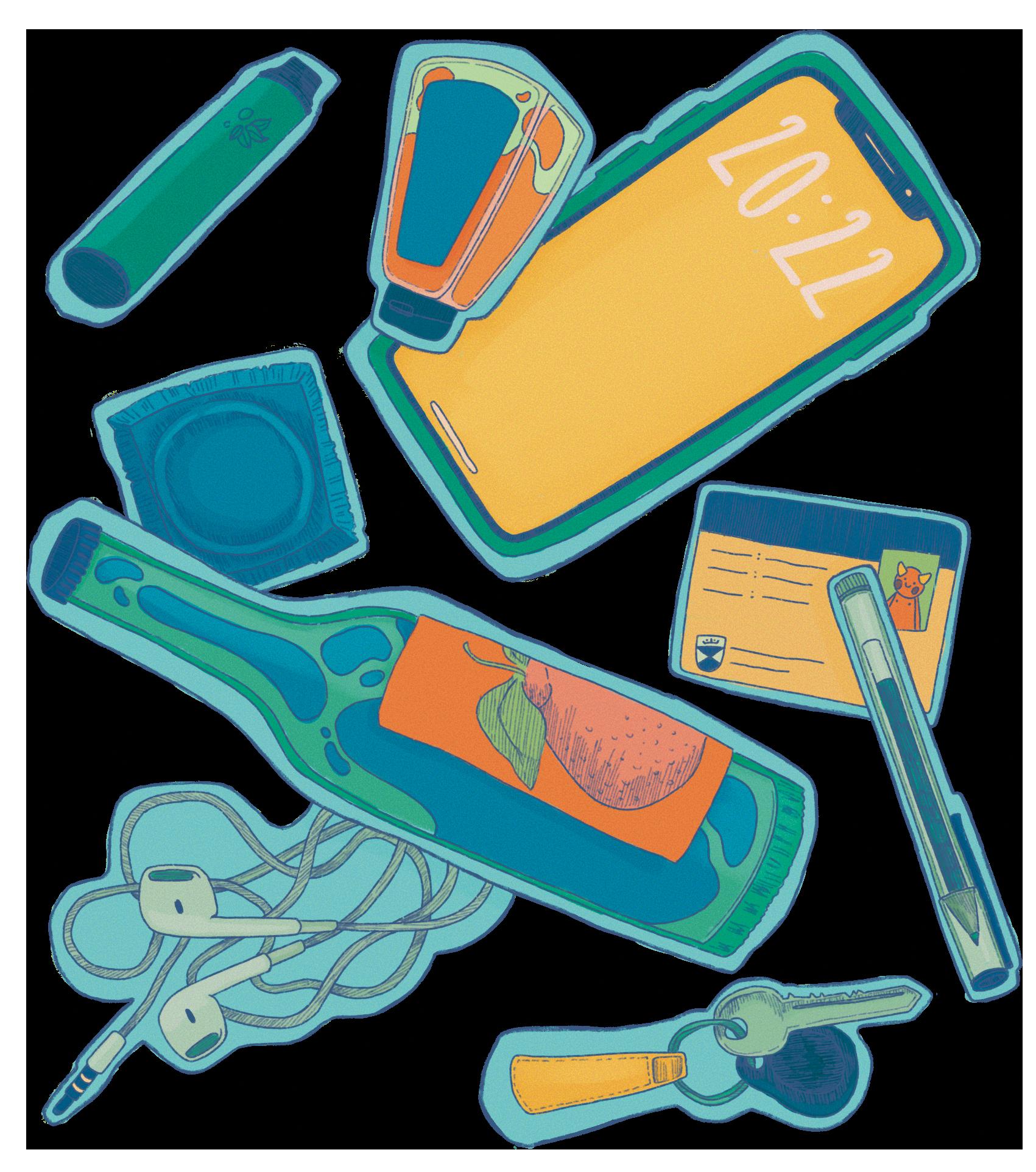
Little
Skills
Beavers
Disasters and beavers - how and in what ways these animals are helpful in avoiding wildefires
DUSAsk 03 Design: Livvie Baird & Phoebe Wilman
Body, My Business | Pg. 06 Review - Everything Everywhere All at Once | Pg. 12
EngineersThe Fire Resistance
of
| Pg. 60
Freshers Issue
the
Issue 95 The Magdalen Magazine
The Magdalen Magazine
@themagdalenmag
The Magdalen Magazine
@themagdalenmag www.themagdalen.co.uk
us online!
Join our team!
If you're a UoD or Abertay student and have a passion for design or writing, we’d love to hear from you!
with
Connect
Messages from
I’m not usually someone who’s lost for words, but I’ve no idea how to sum up how grateful I am that I’m about to embark on this journey as this year’s Editor-in-Chief of The Magdalen, even more so that I’m about to do it hand-in-hand with such a fantastic team of writers, editors and designers that have already been such a joy to work with.
I’d like to give huge thanks to Marcin, whose handover was so thorough and seamless that I felt I was born into this role, and to Phoebe and Livvie, who have helped me so much with finding my feet and welcomed me beside them on this introductory page. I’m so excited for this new academic year and new Mag year, and all the new opportunities it will bring us all!
- Dani
Freshers is upon us! We are back with a shiny new redesign and some cool new additions to the team. First of all, we have introduced an Illustration Team - this is the first Magdalen Illustration Team to ever exist, but we are very passionate about boosting our fellow creatives & seeing them flourish. To us, that's what The Magdalen is all about!
For many of us on the team, this is the beginning of our final year. Going forward, we will want to ensure a high quality of work, have some fun doing so & most of all, keep collaborating! We hope you enjoy this issue, as usual we have seen some amazing creative energy go into it.
- Phoebe & Livvie ❤
Senior Team
the
Table of
Feature
My Body, My Business
Arts & Entertainment
A Coming-of-Age Story
Review - Everything Everywhere All at Once
The Symbolism of the Piano in Two Films Directed by Jane Campion
The Human Con-D’oh-tion: The Spiritual Life of The Simpsons
Creative Writing
Little Pricks
Eve’s Betrayal Kaleidoscope
When I Shiver Butterfly spellbound
10 12 14
18 19 20 22 24 25
Contents
06
16
Current Affairs
The Political Crisis in Sri Lanka
Britainna Unchained From the Public
Human Capital and Migration in Lebanon
Water Crisis in the UK
DUSAsk
The Magdalen's advice column. Got a Question? Ask us!
Society Spotlight
ComDes Society
Guide Dog Society
Lifestyle
From Home to Halls
Victoria’s Secret is Out, Let’s Look at Chanel Reclaiming Exercise
The Fool: A Leap of Faith
26 28 30 31 32 34 35 36 38 40 42
On/Off Campus
A Spot of Cocktails Bring on the Discounts!
Small Steps to a Better Semester
Opinions
‘Alright, Keep Your Secrets’
The Elephant ~TO THE MOON~ in the Room
Can Women Win in Casual Sex?
“Grow a personality, yeah?”
Social Media Has a Predator Issue
Acceptance and Anxiety in Online Fandoms
The Global South Can Make or Break Russia
Science & Technology
Split Brain Research: Two Halves or a Whole?
Little Engineers - The Fire Resistance Skills of Beavers
43 44 46 48 50 52 53 54 55 56 58 60
Feature Words: Niamh O’Donnell 06
CONTENT WARNING: ABORTION
The recent ruling by the United States of America’s Supreme Court to overturn Roe v. Wade, a monumental decision which gave women across the USA the constitutional right to an abortion, shocked people across the world. When I got home from work and watched BBC News at 6, my mum and I cried. My friends cried. Although this decision will not have a direct impact on my right to abortion, the pain I feel for those who will be affected is immense.
Roe v. Wade was a decision made by the US Supreme Court in 1973 and ruled that the right to privacy included the right to an abortion. The law invalidated state laws which banned abortion and in turn acted as a protective measure for the right to an abortion. This ruling was incredibly significant and allowed women of the time to pursue educational and occupational opportunities on their own terms, bringing them closer to equality with men. While there have been Pro-Life activists campaigning to overturn Roe v. Wade for decades, it didn’t seem possible the constitutional protection of abortion rights would ever be reversed, but alas here we are. Pro-Lifers would say this is a victory for those protecting the lives of the unborn, with their argument placing emphasis on the potential that these unborn babies could have for our future society which to them becomes jeopardised by abortions. I hope Pro-Lifers are never in a position where abortion would be an option, and I wonder how keen they are to uphold their argument and outlook on children’s potential futures when it comes to children in the care system who are abandoned, abused and desperate to be adopted by loving families – their lives matter too. But maybe the idea of adoption doesn’t fall under the societal expectations, often driven by religious conservatism, that women should give birth and procreate with their husbands. This is also why transgender men and non-binary people are often left out of the conversation.
Unsurprisingly, we can blame Donald Trump for this. His appointment of three conservative Justices to the Supreme Court during his time in office swung the majority vote to overturn Roe v. Wade following the Dobbs v. Jackson Mississippi case in 2021. Justice Samuel Alito wrote in an opinion draft in February that Roe v. Wade would be overturned as a constitutional measure to return abortion rights to state-elected representatives. As many as 26 states could outlaw abortion without the protection that decisions like Roe v. Wade and Planned Parenthood v. Casey (which upheld Roe) gave American citizens.
Those in America with the ability to get pregnant now have fewer rights than they had 60 years ago. This decision means that around half of US citizens must either travel out of their home state to receive abortion healthcare or carry a pregnancy to term. Not a single Justice on the Supreme Court will need to have an abortion in the future, all being cis-men or women over the expected fertile age. How dystopian to see our rights controlled by those it will not effect. The irony that the so-called ‘leader’ of western democracy has abolished a relatively basic human right is clear; you cannot call yourself the leader of the free world when millions of your citizens are no longer free to make decisions about their own bodies.
It is important to remember that abortion is now not automatically illegal in the US. States like New York, Massachusetts and California have upheld the legal right to abortion and have labelled themselves as safe havens for those in need. However, now legal decisions on abortions can be made at the state level, some states, such as Alabama, Mississippi and Tennessee, are advocating to ban abortion from conception. All states will allow abortion in the circumstance that it will save the life of the pregnant person, however, cases where distressing circumstances brought about conception, will not be granted as exceptions.
Feature 07 Design: Phoebe Wilman
!
Since Roe v. Wade was overturned, a ten-yearold girl has been denied a safe abortion in her home state. She had to travel to another state to receive the healthcare she deserved.
While the social media outcry has been heart-warming, I have been disappointed by the men in my life not showing more public interest. But it’s likely they’ve never had to consider what it would be like to see their human rights advocated for on an Instagram infographic. While people of colour, members of the LGBTQ+ community, women and other minorities are all too familiar with sharing infographics to their Instagram story or retweeting posts which cover the same territory for awareness; straight men may not feel the same obligation; they may not feel the same solidarity. Some may say that sharing a simple post is the bare minimum, and we ‘shouldn’t applaud fish for swimming’ but, in actuality, it does feel supportive, and does make a difference.
When I had a pregnancy scare, there was never a doubt in my mind I would get an abortion. I want to be a parent, but I have no intentions of doing so before I’m financially and mentally capable, like so many others. My choice, should I choose to make it, will never be taken for granted again – like it was a year ago when it was under real consideration. Being in a position in which I had to personally think about the decision I would have had to make has made the recent Roe v. Wade decision all the more shocking.
Whilst abortions are legal and accessible in Scotland, many people do not know the criteria that must be met to actually receive an abortion. The NHS Inform website states that ‘two doctors must agree that an abortion would cause less risk to a woman’s physical or mental health (or that of her children) than continuing with the pregnancy’. Clearly, the law doesn’t state women can have an abortion just because they wish to, which is a very
important but not widely known distinction. It implies that abortion must be the better option, not necessarily the only option –sometimes pregnancy or being a parent doesn’t impact physical or mental health, but that doesn’t mean you should have to carry to term.
The present worry is that our right to abortion may be taken away by the UK Government, which has failed to include the right to abortion in the Human Rights Act Reform Bill. Dominic Raab MP introduced this bill in June, and if passed it will replace the previous Act introduced in 1998, despite calls, from the Law Society for example, that the previous Act did not need to be reformed. When asked, Raab said it wasn’t necessary to include the right to abortion in this bill. However, it is most definitely necessary for human rights to be confirmed in this bill in writing, the right to abortion is no different. If the right to abortion is not included in this Act, any future government has the potential ability to introduce any new abortion laws it wishes to.
In terms of the legality of abortion in the UK previously, we can look at the Offences Against the People Act of 1861, which made causing a miscarriage a criminal offence. This law was reformed under the Abortion Act of 1967 which legalised the procedure if performed before 24 weeks and with the approval of two
“My choice, should I choose to make it, will never be taken for granted again –like it was a year ago when it was under real consideration.”
Feature Words: Niamh O’Donnell 08
doctors. However, the original law (1861) was never repealed, so any purposeful miscarriages or stillbirths which occur after 24 weeks are subject to a criminal investigation. Cases of this nature really do happen; as recently as 2021, a 15-year-old girl was investigated for an early stillbirth which saw her text messages and search history scrutinised.
If one thing can be taken away from Roe v. Wade, it is that our legal right to abortion must be affirmed in writing, in law. Without this, future British governments can repeal the Abortion Act of 1967, making abortion healthcare before 24 weeks illegal again, and consequentially exposing more people to criminal investigation for making decisions about their own bodies.
Even in Northern Ireland, despite abortions being legalised in 2019, access to abortions is far from easy. Grainne Teggart, the Amnesty International campaign manager for Northern Ireland, described abortion access as a ‘postcode lottery’, and that the region is still waiting for these services to be commissioned and accessible. It is proving almost impossible for people to access safe abortions, and many who are more than 10 weeks pregnant still need to travel to England to access this healthcare, despite the 2019 legislation legalising the procedure.
The threat and struggle people face when it comes to abortion accessibility is not only becoming clear in the US with the overturning of Roe v. Wade, and in the UK with the Human Rights Act Reform Bill, but also across the entire world. The need for awareness and action to protect the freedom and rights of those who can get pregnant has never been more apparent. With all this in mind, I would encourage everyone to join the activism, be it online or on the streets; make our voices heard. Write to your local MP and let them know your thoughts about the Human Rights Act Reform Bill. We cannot allow the UK to
follow in America’s footsteps; our rights must be concrete and immovable. I have included information below for those looking to get involved in activism, or for those who are looking for advice about their choices.
Parliament Petition ‘Do not reform the Human Rights Act’ –https://petition.parliament.uk/ petitions/607712
Abortion Out Loud (Advocates for Youth) –https://www.advocatesforyouth.org/abortionout-loud/
British Pregnancy Advisory Service –03457 304020 www.bpas.org
MSI Reproductive Choices UK –0345 300 8090 www.msichoices.org.uk
National Unplanned Pregnancy Service –0333 004 6666 www.nupas.co.uk
Feature 09 Design: Phoebe Wilman
The journey into adulthood always appears as something vast in which we are thrown into without as much as a map. It seems scary and unnavigable, however, it is an experience shared by us all. This could be the key to why coming-of-age stories are so meaningful to our lives, showing that through all this we are not alone. They provide a type of comfort in knowing we’re all in it together in going through things and relief that other people understand.
A Coming-of-Age Story
In the simplest of terms, coming of age is defined by the transition from youth to adulthood. It’s the exploration of this time in life which feels so uniquely liminal, where emotions of both excitement and anxiety are high and sometimes feel constant. Key features of coming-of-age stories include focus on the protagonist’s emotional and personal growth and a more character-driven plot. This allows stories to be both wide-reaching and personal, causing connections to be formed, whether with the story itself or the surrounding community they create. They portray characters in which we can find our own reflection within, whether through a similar situation where our emotions are mirrored or by providing us with someone who just understands us.



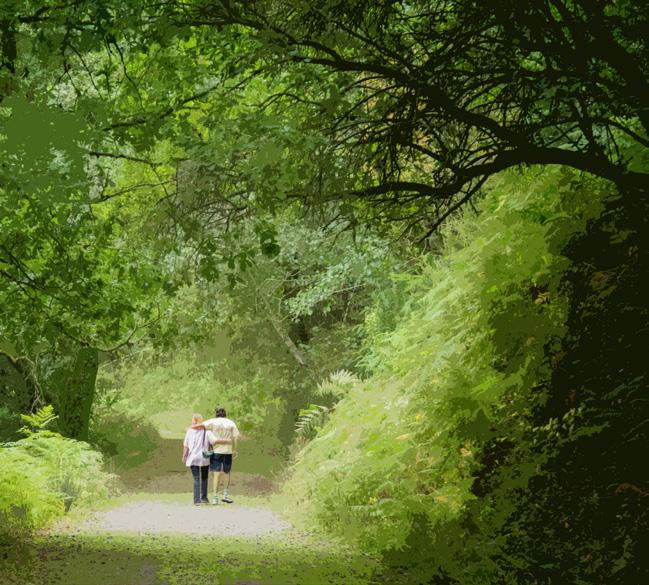



The coming-of-age story is found throughout different forms of media, once again highlighting its significance in our society. The best coming-of-age stories are the ones which we find ourselves coming back to over and over again, whether that’s to find reassurance in a hard time, showing you can get through moments that feel tough or just simply as a form of comfort. From movies to see yourself through books to lose yourself within, comingof-age stories build a world filled with both nostalgia and anticipation to welcome you into.

Arts & Entertainment Words: Caitlin Mathieson
Summer Trip 2014! lost together...
When first thinking about coming-of-agemovies, our minds wander to John Hughes’ 1980s classics, The Breakfast Club (1985), Ferris Bueller’s Day Off (1986), or Pretty in Pink (1986). Known and loved by many, they represent the crux of what the genre means to us; the importance of the journey of growing up and how this allows us to figure out our identities. Overall, they draw on the importance of empathy and understanding during the tumultuous time of figuring out our own place in the world on our own terms, which is why just as these issues are, the films remain timeless. Now framed in nostalgia, they help us soothe our anxieties and fuel our excitement about what growing up means.
TV allows the viewer to go on a longer journey with the characters. In Derry Girls, we watch the group experience growing up against a tumultuous political climate, finding the joy in a background of unrest. In the TV adaptation of Normal People, we get to watch flawed characters making the same mistakes many of us did when navigating the transition from school to uni to life, seeing that both victories and losses are what make us who we are. Sex Education depicts how awkward and messy those years of our life can be, celebrating the weird and sometimes embarrassing moments which help us remember we weren’t alone going through all of this. Showing coming-of-age as stilted and tricky, TV reassures us that growing up is a universal experience and not necessarily a smooth process.



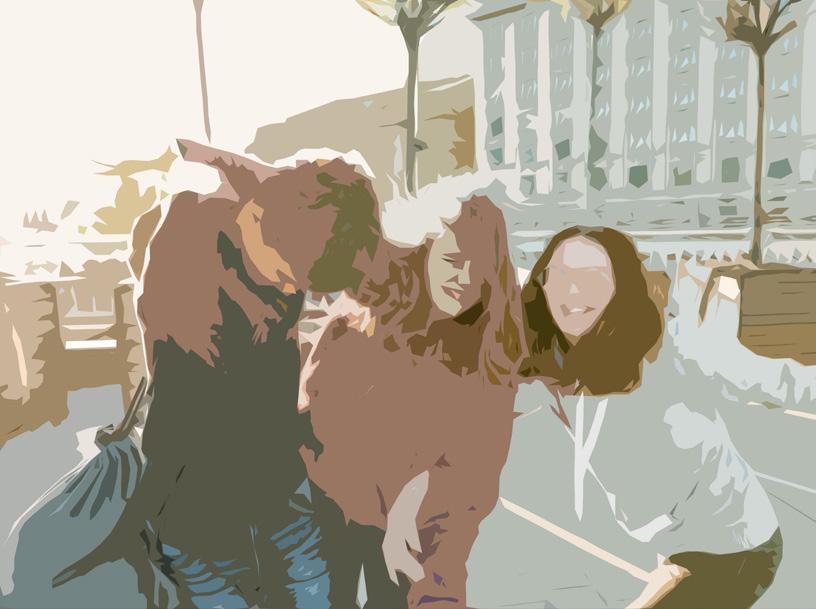

In a contemporary world, coming-of-age not only explores a character’s emotional journey, but the inclusion of social commentary on modern life, removing the idealistic sheen seen in some older coming-of-age stories. Moonlight (2016) shows the protagonist’s struggle with identity in a deeply personal and emotive way. It shines a light on masculine vulnerability, particularly in the black community, and the issues that many face due to the ways in which masculinity is normally portrayed, and the false expectations which come alongside this. It gives voice to the issues of growing up which often go unspoken, therefore reminding those who relate that what they may be going through will be okay. Heteronormative ideas are no longer being pushed with films like Booksmart (2019) and Call Me By Your Name (2017), normalising the fact that queer teenagers go through the same romantic struggles and should be given equal representation in coming-ofage stories. By widening the representation, modern coming-of-age stories allow us to see ourselves reflected on screen and encourage understanding of how other people’s journeys may differ from our own.


The coming-of-age story is something with an inherently timeless quality to it due to the simple fact that it depicts something we have all gone through or are going through: the act of growing up. It allows a retreat from the strong emotions we feel as we explore this new chapter of life. Coming-of-age stories act as a comforting reminder that even if you may feel lonely in this stage of your life, it’s not something you’re experiencing alone.
 Design:
Design:
Jet-skiing!!!!!!! Lookwhowecaughtupwithagain! Arts & Entertainment 11
Joshua Harris
LastsummerbeforeUniversity
Everything Everywhere All at Once
As a concept, the multiverse is becoming increasingly present in the landscape of blockbuster cinema. This is primarily due to the fact that the most powerful juggernaut in the industry at the moment, Marvel (and by extension, Disney), has fully embraced the idea. Alternate realities have been the driving force behind much of the Marvel Cinematic Universe’s (now multiverse) continued expansion since Avengers: Endgame, and it is easy to see why. On paper, it fits well with the outlandish tone of the series and also allows the screenwriters to organically introduce new characters, locations and other plot elements at the drop of a hat. The recent dubbing of phases 4 and 5 of the MCU as The Multiverse Saga has solidified this direction.
Yet, despite the infinite possibilities of the multiverse, I’d be lying if I said that I wasn’t starting to feel kind of fatigued with Marvel. Everything post Endgame was inevitably going to feel like somewhat of an afterthought, and ironically as the scope of the multiverse has broadened with each new entry, the stakes have felt lower and lower. So, when I went in to see Everything Everywhere All at Once, another film that deals with the infinite possibilities of alternative realities, I was concerned that the fatigue I felt with the concept elsewhere would carry over and negatively impact my enjoyment of this film. On the contrary, I have now had my optimism for the multiverse reinvigorated and am excited to see where other filmmakers take it.
The film comes from the directorial duo of Daniel Scheinert and Daniel Kwan, collectively known as ‘Daniels’ – and credited as such. The pair’s only previous feature was Swiss Army Man (2016). Scheinert also directed The Death of Dick Long (2019), without the help of Kwan. They have also directed a number of short
films. As such, ‘Daniels’ represent a relatively fresh voice in the landscape of cinema. While I have not yet seen Swiss Army Man or The Death of Dick Long, I will definitely be checking them out soon, as well as following the pair’s future work with great interest.
Everything Everywhere All at Once follows the protagonist Evelyn Wang (played by Michelle Yeoh), a middle-aged Chinese immigrant to the United States. Alongside her husband Waymond (Ke Huy Quan) she runs the family business – a laundromat. Evelyn is struggling to care for her elderly father, who has always resented her decision to marry Waymond and move to the US. She is also failing to maintain a healthy relationship with her teenage daughter, whose life choices and sexuality are difficult to reconcile with her traditionalist father. On top of all this, her laundromat is being audited by the IRS due to excessive spending on unnecessary items, such as a karaoke machine. Evelyn has begun to believe that life has passed her by and regret the choices she made that led her to her current state of affairs.
This might all be sounding somewhat clichéd, but from the very first scene in the movie it is clear that the opening is building towards something. This turning point comes during an appointment Evelyn has with an IRS officer. Without getting into too many plot spoilers, she is recruited by a character from an alternate universe in order to help combat a malignant force that threatens the existence of all the universes. Evelyn’s journey leads her to interact with alternate versions of herself, ultimately resulting in her reckoning with her own life choices. I won’t give anything else away here, as the film has some genuinely excellent surprises up its sleeve, some funny, some moving, and many others both.
Arts & Entertainment Words: Angus Coleman 12
Review:
As you can probably tell from the title and the premise, the film is extremely large in terms of scope. It does what it says on the poster, quite literally dealing with everything, everywhere all at once. However, what makes it so good is how it’s able to keep so many plates spinning without ever losing the strong thematic and emotional core of its story. There are many scenes which are so incredibly fast-paced and throw so much at the viewer that you begin questioning whether or not you’re absorbing all the necessary information, but the script
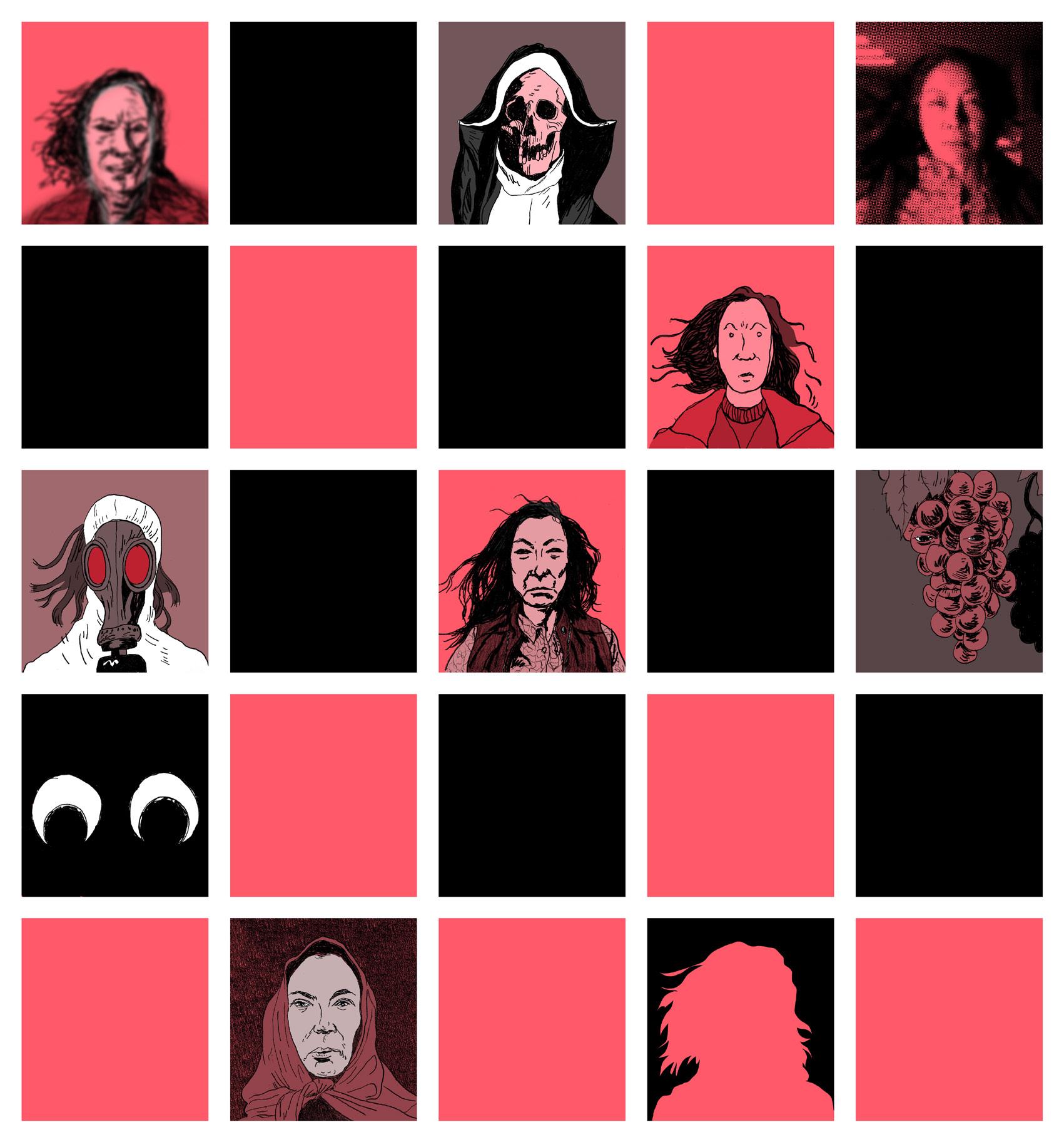
is so slick and airtight that it manages to communicate all the necessary information and also keep you emotionally invested.
Everything Everywhere All at Once shows that the multiverse is a storytelling tool capable of granting material great depth, as well as just size. While its story is a multifaceted and highly absurdist rollercoaster ride, it also manages to remain deeply human. I think it is this contrast, but also harmony, that has allowed it to resonate with so many.
Design: Jack Stamp
Arts & Entertainment 13
The Symbolism of the Piano in Two Films Directed by Jane Campion
It would not be wrong for us to assume that the piano is some kind of a recurring motif in Jane Campion’s body of work as it appears in two of her films, i.e. The Piano (1993) and The Power of the Dog (2021). In both of them, it serves a specific purpose that is of crucial importance to the development of the characters and subsequently to the narratives of the aforementioned films. In this article, I will explore the importance of that particular object, the reasons behind its inclusion in those films, and its meaning to the respective film protagonists.
In the first film to be discussed, The Piano, the whole development of the plot is intricately tied to the object of the piano, as the film’s title itself suggests.
The main protagonist of the film, an electively mute Scottish woman, called Ada McGrath, settles in New Zealand after being sold into marriage to a British frontiersman, called Alisdair Stewart.
Arts & Entertainment Words: Georgi Zhechev 14
Her only way of communicating her basic needs, desires or demands comes through the aid of her infant daughter who understands the sign language her mother uses, through writing and lastly but most prominently –through her piano playing skills. She apparently utilises the piano she owns for expressing her innermost feelings. However, Ada is forced to abandon her piano on the shore, due to her new husband’s fears that it may strip him of his wife’s attention. After all, as an archetype of the predominant British masculinity of the Victorian period, Alisdair is a man who likes to possess things, to believe in his own superiority and exceptionality, and to dominate those who are deemed inferior. For him, Ada is just another possession which only serves the purpose of boosting his public image. Due to these reasons, however, his wife is completely uninterested in him and according to the logic of the film a romance between them simply cannot happen.
The piano as an object belonging originally to Ada and through her to her husband, is then sold to George Baines, a working-class British subject, who buys it in exchange for a part of his lands on the island. Again, for Alisdair the piano is nothing more than a bargaining tool with a certain market value. On the other hand, for Baines, who is illiterate and thus estranged from his compatriots on the island, the piano is much more valuable. He manages to acknowledge its importance for Ada, as he realises that her desire is projected onto it, what psychoanalyst Jacques Lacan would call her objet petit a, and in turn uses it in order to win Ada’s favour. That further emphasises the role of the piano as an object of desire for Ada which allows her to continue desiring, i.e., to imagine herself freed from all the constraints of patriarchal society; Baines in turn gains desire through his ability to see the instrument as an extension of Ada’s body to which he wants to obtain access; Stewart, conversely, views the piano simply as an object of economic exchange.
The piano in the second film to be discussed, The Power of the Dog, serves an entirely different purpose. In it, the instrument is bought by the husband (George Burbank) as a present for his wife (Rose Gordon). However, that present is loaded with expectations: Rose is considered a good piano player
and thus her abilities are to be showcased in front of her husband’s parents and the governor’s family, even though she herself does not feel comfortable performing for them. Although George is a much more open-minded character in comparison to Alisdair, the female partner of the protagonist is still commodified and used to elevate the public standing of her respective husband. In this case, the piano is more of a curse than a blessing for Rose. Facing and rising to the expectations of the others is quite an arduous task for her. After all, she does not play the piano on her own volition, but rather to please her husband. Admittedly, her dread of the piano is also exacerbated by her brother-in-law Phil who mocks her, and that goes to signify what Lacan would call “the Real” for Rose, or, in other words, her own incapability and the inevitable realisation she makes of her impossibility to reach perfection.
To sum up, in the films I have discussed, the piano is established as a symbol of both longing and despair. In both films, it is presented as a means of expressing oneself, a means of communication and even of prestige. Moreover, the piano is portrayed as an object of libidinal exchange; in the case of Ada and Baines – their relationship is situated around the piano. In Rose and George’s case, it is an object carrying distinctly negative connotations because of the social pressure and expectations that have been linked to it. There is, however, a potential in that trend being overturned once the pressure is removed.
Design: Alessia Tavacca
Arts & Entertainment 15
The Human Con-D’oh-tion: The Spiritual Life of The Simpsons
The Simpsons is a TV show that most people will have at least seen some of. Surely everyone knows who Mr Plow is or who originally invented the Flaming Moe? Both are Homer in case you didn’t know. Whether they have studied the depths of the jokes and narratives of the golden age, season 1-10, only tune in to the Halloween specials or have watched all 30+ seasons, follow one of the hundreds of Instagram fan pages, The Simpsons is a televisual cultural icon that looms very large in the collective imagination – even for British people! It’s certainly a good example of America’s cultural dominance here.
What then is it that makes the show such a success? Perhaps its ability to lampoon and hold a mirror to American pop culture? Its framing of a, now admittedly dated, workingclass nuclear family? The indisputable fact of its comedic genius? The beautiful pastel colour palette with its greens, oranges and purples that soothe the eye (seriously, look out for these!)? All these aspects, and others too are certainly central to the success of The Simpsons, but I think the cornerstone of the show is its exploration of the human condition. Whether it’s through Homer’s anxious and uncertain prayers to a God he pays little attention to, Bart’s constant need to redeem himself, or Lisa’s dread when she faces threats to her individuality, The Simpsons’ narratives are continually probing into the existential questions we pose and the answers we seek, and sometimes find, to them. This is the fundamental success of The Simpsons, perhaps second only to the comedy.
In the Season 4 episode ‘Homer’s Triple Bypass’, Homer prays alone in a hospital bed as he awaits a potentially life-threatening operation due the next day. In the Season 6 episode ‘Lisa’s Rival’, Lisa encounters a student in her class who is as, if not more, academically successful than her. This results in her Poestyle sabotage of a The Tell-Tale Heart diorama which is saved just in time as Lisa comes to accept that her identity doesn’t rest entirely on her academic superiority. In Season 7’s ‘Bart Sells His Soul’, Bart sells his soul to Milhouse only to go on a journey that leads to him praying by his bed for its return. Explorations of prayer, identity, redemption, morality and meditation are engrained into the core of the show.
So, the next time you’re feeling confused or scared about the world and its meaning, consider watching The Simpsons. It will certainly make you laugh, and it might help you make a bit more sense of life too.
“The Simpsons is a televisual cultural icon that looms very large in the collective imagination”
Arts & Entertainment Words: Andrew Young 16
 Design: Livvie Baird
Design: Livvie Baird
Arts & Entertainment 17
During my first Freshers Fair, folks handed out cacti. The scheme was called ‘Don’t Be A Prick’ –say three Union Code of Conduct rules to earn a plant. It wasn’t hard, basically a free give-away, as the Code of Conduct was printed on a large poster adjacent to the stand. Squat in a plastic cup, my spiny trophy easily fitted into my palm. Its little pricks grazed the skin, piercing against my fuzzy awareness of change. As if I were looking out of a car window, the world streaming past; ungraspable. I pressed fingertips to needles while strangers dragged me past societies I was too nervous to join. Later, my cactus went in a free tote bag, jumbled with flyers, badges and those plastic things that discourage spiking.
The plant barely survived its first Winter. The ferocious accommodation heating dried it out. I didn’t notice because I avoided my room. Halls felt like a prison – my cell was nice, but seeped with unavoidable hollowness. By this point it was clear no one in the flat, lovely as they were, would be rushing to meet after first year. The cactus, gathering dust, spread brown at the base.
When I returned for second semester, the plant was squishy and dulled. It took a couple of weeks to heal, careful watering. Its smooth surface swelled, sunlight illuminating shifting shades of green. Then Covid struck. Everyone rushed home. I left my budding globe, thinking I’d be back soon. It died.
The cactus became slime in a soft brown shell, curving under my touch. Had to throw it in the bin. Coming back to university was similar to starting over. People told me how happy they were to return and I bit my tongue. Most kept to their flats, online classes, stepping out for mask toted meetings and freezing alfresco meals. I kept my head down while my abandoned cactus decomposed in a dump somewhere.
I didn’t plan to go to another Fresher’s Fair, it seemed rather unnecessary for a third year. Then friends, joyful that events could be held again, suggested meeting there. We wandered around stalls, trading opinions on the societies we’d joined. Turned a corner, there was the cacti give-away. This time you didn’t have to say anything; lock-down has passed, you’ve shown up, have a cactus. With care, I carried my new plant home to my flat, resolved to keep it alive.
Now in its second pot, the plant surges in growth, its prickles shrinking compared to its fresh green surface. Maybe I’ll get a second one this Freshers, a backup; though I’m not worried about losing my current cactus – it’s in its stride now.
Words: Renée Dumenil, Design: Belle Roach
Creative Writing 18
E



eden is paradise except it wasn’t quite.
VE’SBE T R AYAL









this world made for man held me captive I was taken out of him, grown from rib, his flesh and bone incomplete, before my eyes fell upon Her.
broken a rule, never stepped out of line, but this red, this beacon, pulled me forward whispered to me, spoke as though I was god's masterpiece, as if I were adam
he prohibited pleasure, encouraged naivety the garden where the sun had always shone upon flowers and trees and animals man could only dream fell grey under his rule, a monotone existence until a spark of red seeping from a single tree enticed a lost soul into the forbidden.
I had never
enthralled by my beauty She had come to release me as I got closer I saw myself in the reflection of ethereal eyes, adam's custody no longer weighed heavily over my skin She had snaked around me offering warmth our proximity awoke colours from their slumber.
I was banished for my sin but I feel no guilt for She was my solace from a heaven that was hell on earth.
Words: Kate Heggie, Design: Joshua Medcraf
Creative Writing 19
Kaleidoscope
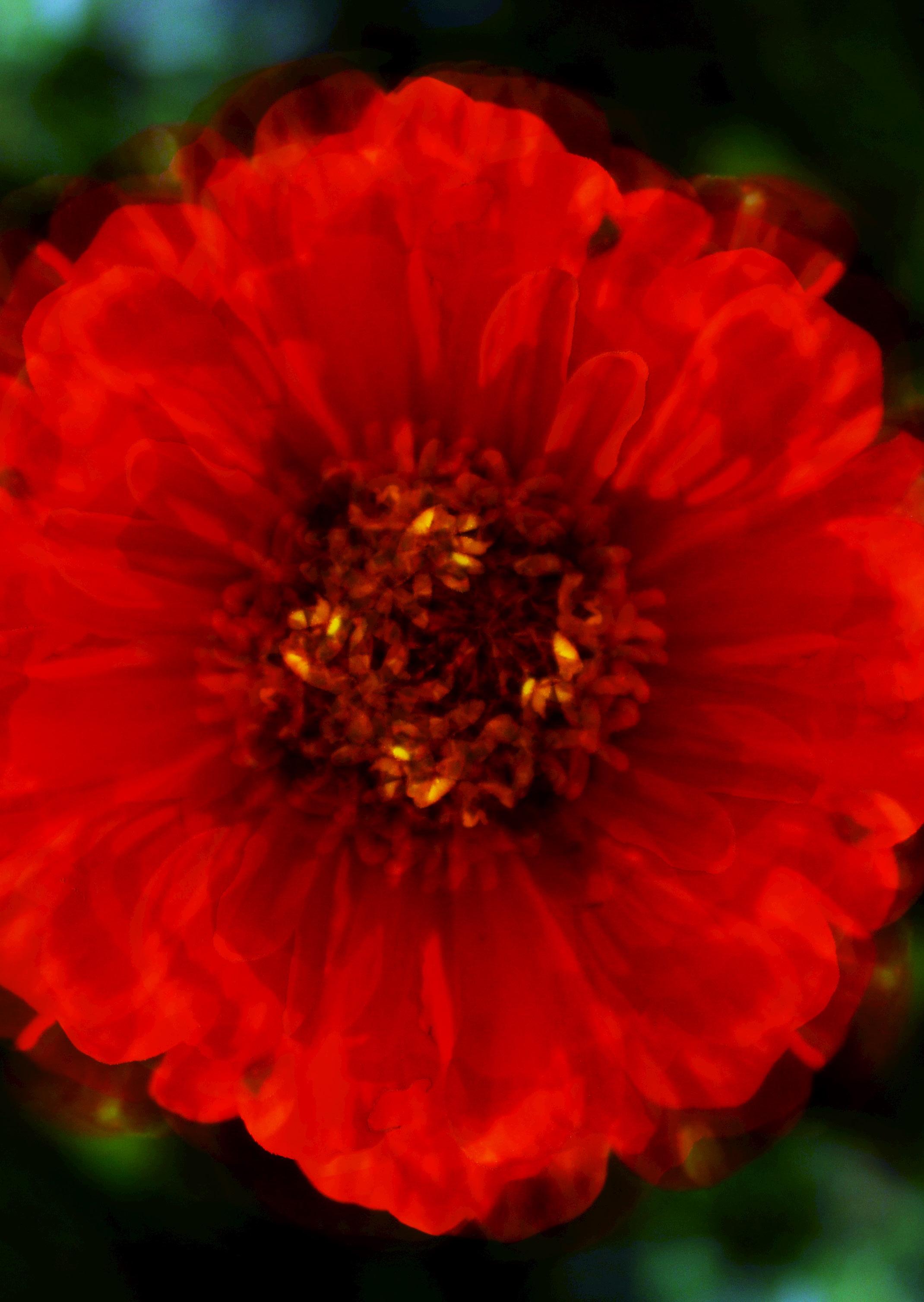
Squinting into stained glass quartz-eyed, expanding like rose-tinted halos or puffs of pink candyfloss, sugar sparkling air
Our dawn dappled vision collapses into romantic ribbons of moon in one relieved sigh, one giddy spin, every day the same pattern We unfold each other gently, like the wings of a butterfly over and over and over again
I’ll never tire of this world within my eye –
Cells swarming into one another like ants, disappearing into the crevices of nowhere Diamonds of flowers either blooming or dying –it all looks the same Dawn and dusk collapsing upon each other an amber avalanche fighting the rising tide Ears immune to the crunch and grind behind the silent masquerade Eyes glazed, coated with blind awe Glass spasms and writhers a tumbler of dry clinks whirling beneath the filters churning trouble
Rainbows sucked in upon themselves shrinking and shrivelling into a pale void Dreams dying in the drains of nothingness
Clutching the cannister like a lifeline Trundling the wheel yet remaining still Squinting into a crystallised pocket in time, a tear in the void she ripples her fantasies into shape, curling in the palms of her hand weaving herself away from reality on a cheap plastic gyre. She knows when they tear each other open, it’s as dry as crisp autumn leaves The chilling wind forces her to crunch around in grey circles
So back in the iris mirror house warm colours warble falsities She hibernates in tunnel vision
Design and Photography: Lucas Ferguson Creative Writing 21
When I Shiver
Lights go by on the wall, plain alabaster momentarily made into a golden ladder. Then the car is gone, and Aliyah is once again alone in a dark room.
She has left the light off, hoping that in the dark her visitor might not notice the roaring red of her cheeks. She has never managed to keep a thought from crossing her face. When she was little and forced to sit at a dinner table, faceless adults would croon at her like a finely bred cat. When she wrinkled her nose in distaste, her father used to scold her under his breath. “Ali.” He would say, “ Wipe that face off now before I scrub it for you.”
Now, Aliyah touches her cheeks in the dark. She remembers the rawness of her youth, the stinging brought forth by flannel and soap. Even at this age, the feel of water on her face makes her breath catch.
When she was older she became more skilled, not at controlling her expression but rather at avoiding any feelings that might make it sour. She practiced smoothness, training her skin into a stillness like a puddle on a quiet street. When her father’s friends leered at her, or pressed their clammy hands around

her shoulders and hips, she would empty her mind and think of a quiet forest. Her mother approved of this response. “You’ll age like a marble statue, sweetheart. Ever so lovely.”
Aliyah remembered a trip to a museum, the exact time or circumstance is a muddle of pubescent memories and vague milestones but she remembers vividly the statues. There was a girl in the room, known to her but not a friend. She had eyes the colour of chestnuts. For some time Aliyah wandered near her, not knowing why but feeling an urge to catch her eye. In the statue room, Aliyah felt disdain for the marble maidens. They were a great lie, she felt. So perfect in their construction that they looked soft as clouds, their eyes wistful and loving. Pity, she thought, that they were cold and hard to the touch.
The girl enjoyed them, however. She lingered a while in that room, gazing at alabaster eyes with a deep intrigue. Aliyah found herself wishing she would look at her like that, then found herself breathless when the girl did.
In the hotel room, Aliyah re-experiences some of the same sensations she felt at that moment. The rapid knock of her heartbeat like
Creative Writing 22
chattering teeth, the sweat and lightness in her head. She feels as though she is spinning, as though she desperately needs a hot bath and to curl up in her childhood bedroom with covers over her head.

Her phone lights up, casting blue onto the sheets. ‘I’ll be there soon. Can’t wait to see you. X’
Her chest tightens.
For a while she has been nervously tugging at the sleeves of her shirt, and suddenly she feels she is wearing entirely the wrong clothes. Too swooping a neckline, too long a hemline. Clothing has always been something others decided for her. Her ex-fiancé was meticulous about what she wore. Every dress had to match the accent of his suit, every neckline had to be enticing but classy, and every heel no more than 2 inches. He hated to be towered over.
“It’s for your own good, my dove. You don’t want to seem un-ladylike, do you?”
Still, she remembers how his hand felt pressed against her back. How he would steer her through rooms of people like she might wander off if he let her go. At night, when he would fumble over her buttons and shove her upon the bed, she was often driven mad by how much she hated those hands. Sometimes she still feels the icy phantoms of them along her neck and thighs. There was never any gentleness in his touch, never any pleasure.
Briefly, as she recalls his presence, she begins to panic. What if, she thinks, it’s the same again? What if, she starts to shake, it was me that was the problem?
Her reverie is interrupted by a beep and the hotel door swinging open. A woman walks in, spilling light like honey into the darkness.
“Hey,” the woman says “sorry I’m late, I wasWhy are you in the dark?”
Click. The room takes shape as the bulb glows.
“Oh god, have you been crying?” The woman sits beside Aliyah, concern written all over the soft features of her face.
She smells like pine and earth, Aliyah notes as she turns to face her.
“Hey, it’s okay.” She reaches a hand up to Aliyah’s’ cheek and wipes away a tear, then holds it there. “Would you like to reschedule? If you’re not feeling good today, we can wfind another.”
All Aliyah can feel is the warmth of her hand. It is a sensation that pulsates to the tips of her fingers like a static buzz.
“I’m okay.” Aliyah smiles, leans forward, and presses her lips to her partner’s. They melt together, lost in a moment that belongs to only them. Under soft fingers, Aliyah shivers, feeling entirely new.
Creative Writing 23
utterfly
I’ll still be awake when a blue sun rises. My eyes and teeth will sting from another long night. A hum in my ears will rise to silence the birds, the traffic, the laughter. There’s nothing left to see, but that’s okay- behind my eyes is where the magic happens.
It’s September 30th and I’m alone on the floor. Bristling television static casts my flesh a milky pale as my dog stretches over me and nudges a wet nose, I tell her to piss off. It’s not October yet—and what if it was? Why should the sun even rise? Who would even notice if it didn’t? After all, I’m the only one here. It’s been the 30th of September for 9 long months, a day so still that I’m beginning to feel the galactic tumble of earth through the ground. The television hums quietly, but there’s nothing on when the sun goes down, it’s all repeats and broken transmissions. The light of the set burns against the black of the room. Through an optic sting the black, demonic quality of a light is revealed to me.
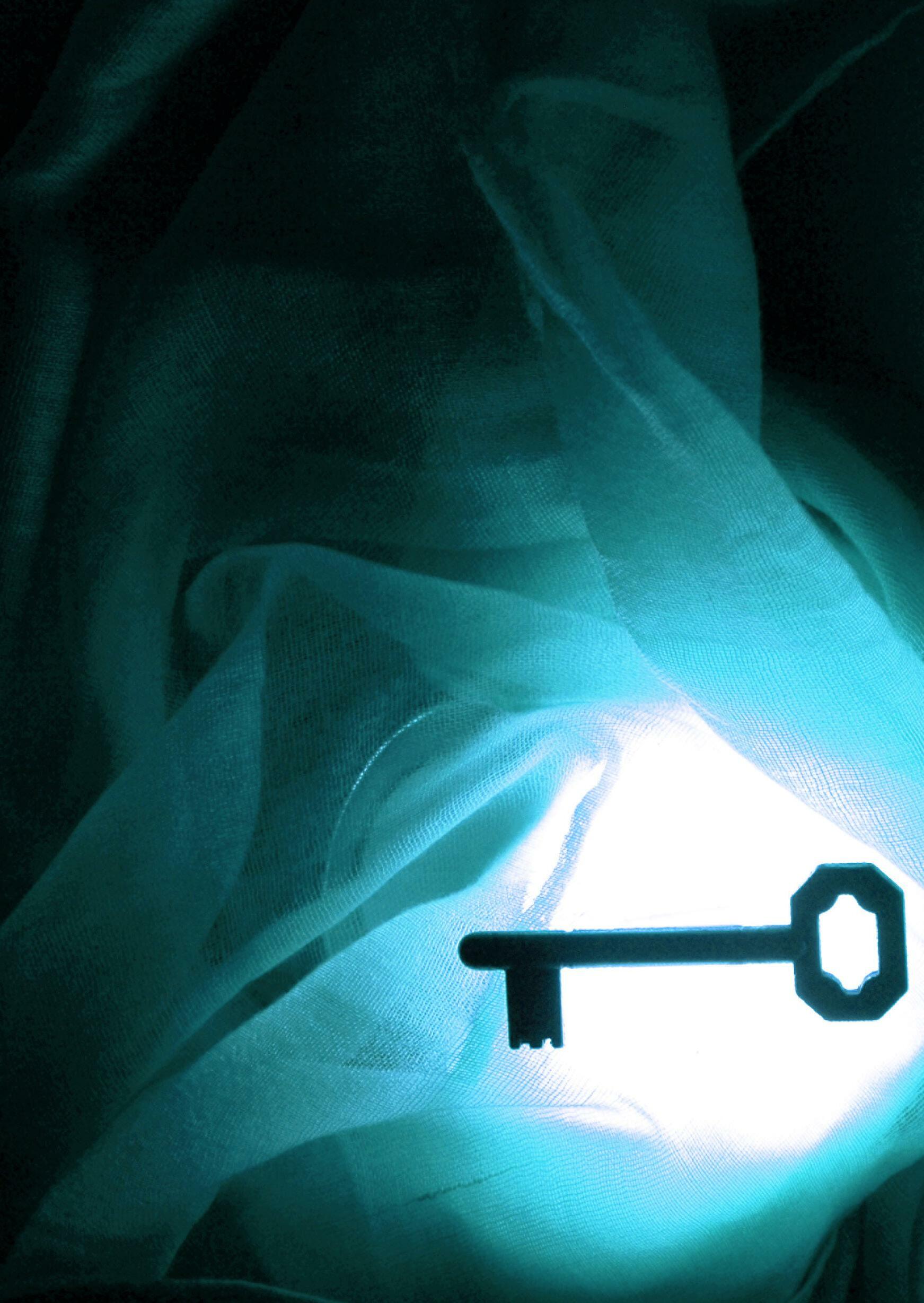
I’ve been hovering through public spaces like a storm cloud, bleeding out through a trouser leg. I could pick up the phone and call for help, but I can barely remember the sound of my own voice. Besides, it has nothing left to say, and if it left me again now, I’d remember the tone through which I always said no. Flashing like the final synapses— images on the television. Like films, pictures burst, one after the other, frame by frame. Every memory, every moment- lucid and tactile. The glass of a screen is a window.
Sometimes through those terrible moments I could leave myself and flap against the ceiling like a trapped butterfly. In a world bleached of colour, those feverish red wings turned blue and grey, damp, like bruises- so fragile that they could be pulled apart like napkins. I could look down on myself in all of those rooms. Through the buzzing, thousand eyes I could stare. There was no escape, no crack in a window, only the spectacle. On a screen, from a window. In a garden, on a bus. If I’m anywhere, I’m there. The clocks turn back and the sun blinks, no matter where I go, I’m always right there.
Words: Anonymous, Design & Photography: Maria Touloupa
Creative Writing
24
B
CONTENT WARNING: ABUSE/PTSD!
spellbound
skeleton fingers claw at the sky covered in a silver, sobbed-through shroud. wriggling, they attempt a coin trick with the moon it slips through the cracks. they lost their june-gloves pink-white ruffles covering gaps, hiding hands. the secret to stealing the moon.
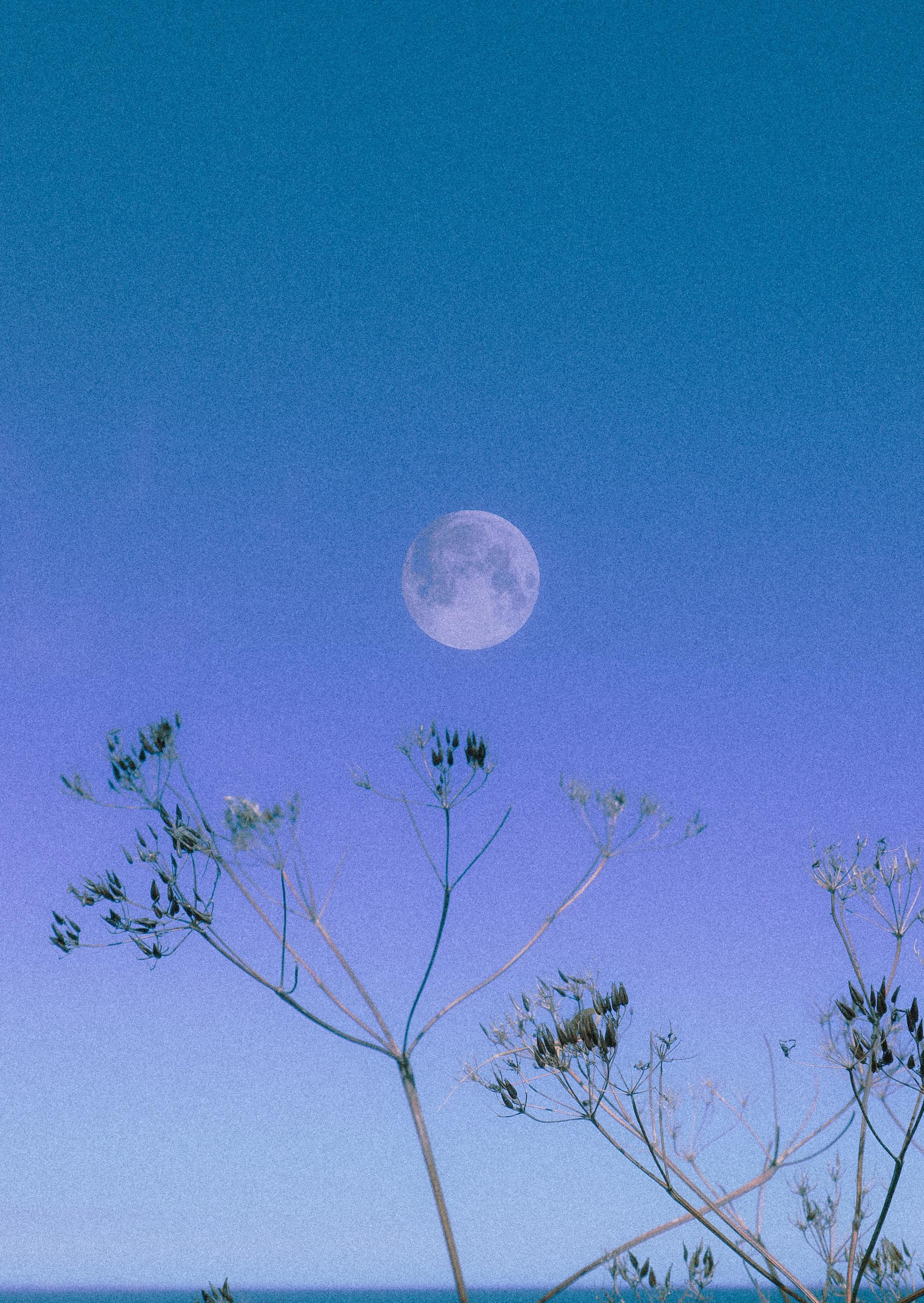
winter is magician’s end. see through season. the november of bare bones.
i don’t tell secrets in winter.
autumn is the year’s last trick an unveiling that must last till spring. that’s why i like silver-tongued september best.
he comes with the swirl of a windy cape the laugh of a crow explodes in ashen rain and ember leaves burns all down while you watched the moon.
here’s a miracle for you: with the slight of just one hand all is burnt to ashes and yet we rise again.
Words: Rebecca Raddatz, Design: Phoebe Wilman, Photography: Ada Ung
Creative Writing 25
Sri Lanka’s Economic Crisis
Sri Lanka is a country in turmoil. The previous president, Lieutenant Colonel Gotabaya Rajapaksa fled the country on the 9th of July 2022, hours before his home was stormed by crowds of angry protesters. The home of Prime Minister Ranil Wickremesinghe was also invaded, and even set alight. Following this, both men resigned from their positions, and Rajapaksa ended up in exile in Singapore. The cause for this turn of events, and the unrest which led to it, was one of the most severe economic crises in the history of the country.
The Rajapaksa family is one of Sri Lanka’s most powerful and longest reigning political dynasties. Members of the family have been present in Sri Lankan politics since the 1930s, dominating locally in the southern province of Hambantota for three decades. Their political power fluctuated somewhat from the 70s onwards, until in 2005, Mahinda Rajapaksa was elected president. He held this position until 2015, when Maithripala Sirisena was elected, but power returned to the Rajapaksa family with the election of Mahinda Rajapaksa’s younger brother, Gotabaya Rajapaksa in 2019. Gotabaya boasted a distinguished military career and had served his older brother’s administration as Defence Secretary.
Both Rajapaksa presidents branded themselves as strong Sri Lankan nationalists. This was an image that became strongly associated with Mahinda Rajapaksa due to his successful offensive that brought an end to the Sri Lankan civil war. Lasting from the early 80s to the late 2000s, the war involved a series of insurgencies by Tamil nationalists against the government, in response to the widespread persecution of the Tamil people by the Sinhalese majority since the island’s independence from the British Empire. This hard-line nationalism would later be reflected in the policy choices made by Gotabaya Rajapaksa and his administration.
His isolationist economic decisions played a major role in bringing about the conditions necessary for the collapse of the country’s economy. Experts have cited successive governments’ economic maladministration as cause for the crisis, but the downward spiral truly began following Gotabaya Rajapaksa’s election. Very soon after assuming the presidency, Rajapaksa’s administration introduced the biggest tax cuts in Sri Lanka’s history. This was intended to increase spending in order to reinvigorate the economy, but only hampered the government’s ability to respond to crises by truncating their source of income.
Current Affairs Words: Angus Coleman 26
Circumstances soured even further with the arrival of the COVID-19 pandemic. Tourism is one of Sri Lanka’s main industries and had already been negatively impacted by a number of successive crises such as the civil war and the 2004 Boxing Day Tsunami. The country’s tourism industry contributes 12.5% of its gross domestic product and represents 250,000 employment opportunities for local people.
As such, the sudden end to foreign travel due to lockdowns all over the world meant that even less money was in circulation.
Furthermore, Sri Lanka is in considerable debt. This is due, in large part, to significant borrowing following the civil war in order to fund new growth in the country. According to a report by the Financial Times, the country owes approximately $51bn to, most notably, China, Japan and India. When the government missed a deadline to repay certain foreign debts in May, Sri Lanka became the first country in Asia to sovereign default since Pakistan in 1999.
Rajapaksa’s government ran the country’s economy even further into the ground with an unexpected and rapidly introduced ban on chemical fertilisers in April 2021. While this policy was not in principle widely unpopular, it was implemented far too fast and resulted
in significant damage to Sri Lanka’s usually bounteous crop yields. Fruit and vegetable crops were badly hit, with rice, a staple food, especially damaged. Rice yields in 2021-22 dropped by around 470,000 tonnes. All of these factors combined to make day-to-day life for Sri Lanka’s people extremely difficult. Skyrocketing prices for food, fuel and other vital commodities, have left citizens struggling to make ends meet. As the state of affairs worsened, their frustration reached boiling point, leading to protests and the eventual removal of the President.
In the weeks since Rajapaksa’s removal, Ranil Wickremesinghe has ascended to the office of the president. Many people remain unhappy, desiring fresh leadership instead of a hangover from the previous administration. The expectations on the new government are high, including successful negotiations with the International Monetary Fund and domestic reforms in order to begin to pay off some of the debt. Whether or not this is a turning point for Sri Lanka remains to be seen, but there is no doubt that the road ahead will be arduous, and a lot of work will need to be done for Sri Lanka to begin to rebuild itself, and perhaps give its people some hope for a brighter future.
Current Affairs 27 Design: Phoebe Wilman
Britannia Unchained:

Truss, the last Tory PM?

It’s looking likely that Foreign Secretary Liz Truss will be chosen by Conservative Party members to replace Boris Johnson, who they seem to view as the Boris Johnson continuity candidate. They may regret this decision.
The first commitments of her campaign were to increase public spending by 30bn to cover a suspension of green levies on power, a plan to scrap next year’s rise in corporation tax, and a reversal on the recent rise in National Insurance. Reversing a tax rise your government very recently introduced doesn’t typically inspire confidence. On August 1st, a press release by the Liz4Leader campaign advocated for cutting the wages of public service workers, specifically teachers and nurses, to put 8bn back in government coffers. The proposals could be read as a way of distinguishing herself from the former chancellor, opponent Rishi Sunak who signed off on the furlough and tax rises.
The pledge to reverse the rise in National Insurance is less impressive if you compare the 1.25% return to the public with the 54% energy price cap increase this year, an issue this government has no plan to tackle. Centrica, owner of Britain’s largest energy supplier British Gas enjoyed profits of 1.3bn in the last 6 months, five times the amount earned in the same period of 2021. Voters will have to squint hard to see too much regulation as the issue here. Truss’ commitment to scrap the rise in corporation tax, after all, will make companies like British Gas better off.
For an idea of what the presumptive future PM thinks, we may look at Britannia Unchained, authored by one Elizabeth Truss - alongside Deputy Prime Minister Dominic Raab, former Home Secretary Priti Patel, Secretary of State for Business Kwasi Karteng and Chris Skidmore MP. Why not begin with the book’s most famous quote: “The British are among the worst idlers in the world. We work among the lowest hours; we retire early, and our productivity is poor. Whereas Indian children aspire to be doctors or businessmen, the British are more interested in football and pop music.”
Looking beyond this insulting excerpt, what stands out most is that the book is light on the brash patriotism of the Brexit campaign. It doesn’t take aim at the tech monopolists, rather it praises the ‘risk-taking’ of California’s tech sector.
Current Affairs Words: Liam McClurg 28
There’s nothing for ‘left behind heartlands’ of 2019 messaging in “[we should] stop indulging in irrelevant debates about sharing the pie between manufacturing and services, the north and the south, women and men”. As shown in the above paragraph, the text doesn’t much care for the working class.

One thing the book doesn’t like is European trade union laws. So, when Truss vows to “unleash the full potential of Britain postBrexit and accelerate plans to get EU law off our statute books so we can boost growth” what she means, as stated in the Channel 4 debate, is to prevent striking in some parts of the public sector. Trade Union Congress deputy chief Frances O’Grady called her plans: “ideological posturing at the expense of ordinary working people” stating “these [laws] are all essential, not a nice-to-have”
There was renewed interest in Britannia Unchained when Johnson selected his cabinet in 2019, but the rolling back of the state it advocated for was largely missing from their policy program, this is potentially owing to our reliance on the powers of the state for covid relief. The book is light on direct policy proposals, rather suggesting we emulate the success of other nations. In Japan, we’re told that 85% of kids study Maths at A-level, compared to 15% of British pupils. The education department under Johnson did dedicate 10m to assist with the development of core skills in July 2019, though this doesn’t appear to be an aim for sustained improvement in attainment.
We hear praise of Israel’s tech sector; the Johnson government’s Levelling Up plans do aim to increase innovation. Though the focus is largely on bringing Glasgow, Manchester and the Midlands in line with the South. They include the rolling out of 5G and £100m funding for research and development. This will undoubtedly help the development of tech in the U.K., but pale in comparison to the 4.1% of GDP Israel spends on start-up development each year.
For the Foreign Secretary’s part, there have been no proposals in common with what’s in the pages of this book in her pitch for Prime Minister. In fact, Canada is praised in the book for reducing government spending by 20% between 1992 and 1997, while Truss has not advocated for such a dramatic cut. This gets to the contradiction inherent to Britannia Unchained, Japan’s education system relies on huge government investment, as does Israel’s tech sector, it’s unclear how Britain could match this, while cutting government spending.
Boris Johnson went from extremely popular to persona-non-grata in record time - an 80-seat majority is unlikely to be replicated for many years. The Tories have an incredible ability to shapeshift, a similarly pessimistic view could have been taken in mid-2017-19, but now their future doesn’t look bright. Liz Truss says this could be the start of a bright new future for Britain, and she may well be correct, it could even be under a Labour government.
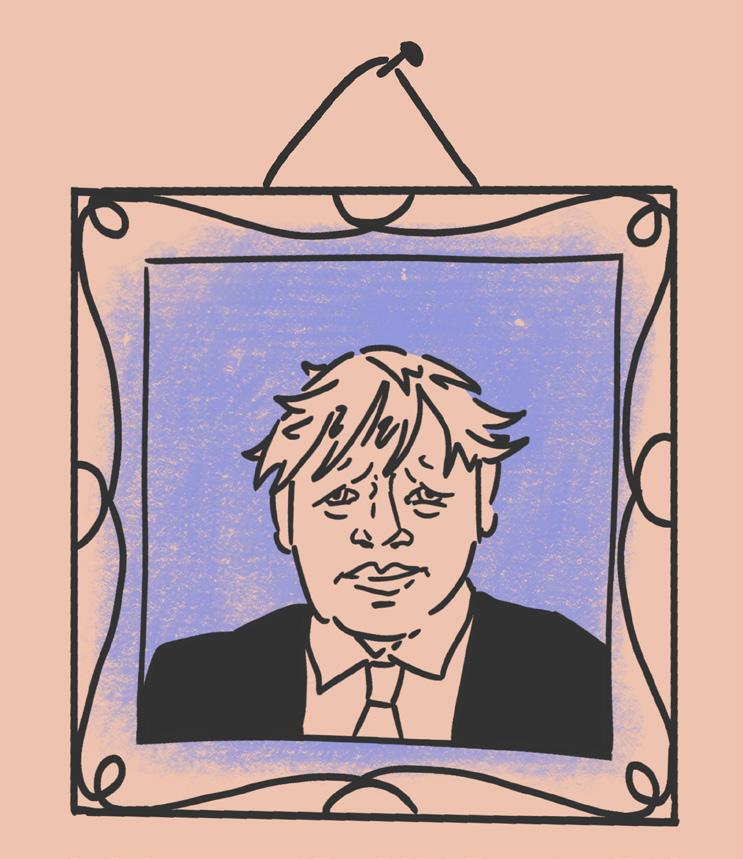
Current Affairs 29 Design: Constance McRobert-Smith
The Long Journey Ahead of Lebanon
Lebanon’s healthcare system crumbled in the wake of the 2020 explosion. Although COVID-19 was not a prominent concern initially for Lebanon, the chaos and lack of distancing in the aftermath of the blast led to two severe waves bombarding its healthcare system. On top of this, ‘brain drain’ occurring across the nation affected healthcare staffing.


“The loss of an estimated 1,000 medical health professionals since the devastating Port of Beirut blast in August 2020 has compounded the resource crisis facing hospitals and clinics during the pandemic.”
the migration of skilled workers can circle back to future investment into a nation, ‘brain circulation’ which could be essential in mitigating an ageing demographic.
Low investment into the educational system actively erodes the country’s future academic outlook.
country preceding the disaster, stemmed from governmental corruption and disorganisation. Economic mismanagement left the country in significant debt, basic resource costs rose, the healthcare system became severely underfunded, there was uncalled for taxation and high unemployment.
These factors have continued to deteriorate following the disaster pushing people away, with the country’s currency rapidly losing its value, causing hyperinflation.
Rich with history and culture, Lebanon has always seen its citizens migrating abroad for career opportunities. However, increasingly swathes of its young citizens are fleeing as a result of how bad things have become, causing a ‘brain drain’. Those leaving are young university educated professionals in search of a better standard of life. Many crucial job positions in law, academia and healthcare, are now left vacant.
A potential silver lining of the exodus, is evidence that often
“Low levels of learning and skills mismatch in the job market have put the future of generations of Lebanese children at risk and imply a critical need for more and better targeted investments in the sector.”
With no current trajectory for change and worsening job security people are leaving, and things are continuing to destabilise, indicating the steep climb toward recovery for Lebanon.
Current Affairs
Water Crisis in the UK
The UK is currently facing a water shortage. The cause for this is low conservation of supplies. Climate change coupled with environmental degradation is an aggravating factor. Decreased and uneven rainfall due to climate change is creating drought risk. Both state and individual level action will need to be taken to deal with water stress.
Current Water Crisis
The primary reason behind the current water crisis in the UK is the increased demand for limited available resources and lack of investment in infrastructure to match demand. The demand has increased mainly because of the population growth, with UK population having grown by over 10 million since the 1980s. There is regional difference, in Scotland ground water level may be normal during summer but in England there is high chance of groundwater, river flows and reservoir levels dipping to dangerous levels. Water is a privatised utility in England and Wales. Where water bills have risen by a close to 40 per cent according to the National Audit Office but investment in this sector remains insufficient, increasing the water stress.
How to combat water stress?
There are specific ways of mitigating water stress. First, resources must be used sustainably. The need for development must be balanced against the needs of ecosystems and the environment. The water companies of the UK must come forward and have a robust Water Resource Management Plan in place. They should also plan for a significant reduction in water leakage, with millions of litres of water currently lost each day to leakage. Thames Water has announced measures to be implemented soon. There have also been short term restrictions on using excess water to ensure water supplies are not exhausted, such as the hose pipe ban throughout much of England and Wales. Deforestation also must be checked as it results in reduced rainfall, local increase in flooding, and river siltation. Secondly managing the risks of climate change is essential. This can be achieved by reducing carbon emissions mostly from energy used in the home, driving, and air travel. As well as large scale investment in renewable energy sources and decarbonisation of the economy.


Water management
UNICEF’s Global Water Partnership framework for action has also mentioned that “the water crisis is mainly a crisis of governance”. Water management needs to be based on a participatory approach to avoiding fragmented management. The water management system is based on three pillars improving water planning, informing cost-effective investment decisions, and mitigating risks. All these measures should be adopted combinedly. The government needs to effectively address the problems to minimize the aggravating factors of the water crisis.
Current Affairs 31 Words: Debarati Bhattacharyya, Design: Arwin Quiachon
DUSAsk
We're Candy, Lauren & Sylwia from DUSA's Advice Team! We're here to support you with university life (academic issues, housing, wellbeing, complaints, signposting, advocacy and much more. If you'd like to pop in and chat, you can find us at DUSA level 4 in the HIVE or email advice@dusa.co.uk. This month we're giving all of our best Freshers advice. Look out for our monthly advice page!
I’m worried that I’ll struggle to make friends, is there an easy way to meet new people?
What if I don't enjoy my course, can I switch throughout the year?
Definitely! At DUSA we have a huge range of student-led societies where students can meet like-minded people and take part in fun activities throughout the year. Joining a society can also help you to try something new and get out of your comfort zone. Check out the societies page on our website for more information on what types of groups you can get involved with, and how to get in touch with them:
https://www.dusa.co.uk/societies/
The University’s Sports Union also run a range of clubs on campus, all the way from archery to canoeing. There really is something for everyone!
There are also lot of opportunities to get involved in student representation and volunteering for local charities and organisations. Have a chat with our student executive team who can tell you all about how to get involved!
Yes you can, and many courses allow students to change both within and out with their current school. It’s worth double checking with your advisor of studies first, but you can also chat to one of the student support advisors in the enquiry centre about this, and they’ll help you create a plan of action. If you’re no longer sure that you’d like to continue with your course, email stayoncourse@dundee.ac.uk and someone in the team will be able to support you.
If I fail an exam or coursework, is there support available?
Sometimes things don’t quite go to plan, and we can help when it comes to appealing module grades or exams. If you receive a grade that you aren’t happy with, email us at advice@dusa.co.uk and we can talk you through the university’s appeals process.
DUSAsk Words: DUSA Advice Team 32
No, if you are a full-time student, you are not required to pay council tax. If you live with a non-student, the household may be eligible for a discount on council tax. If you receive a council tax bill, you should let the council know of your student status as soon as you can.
Is it easy to get around Dundee?
A great place to look for part-time jobs is the University’s online ‘Job Shop’, which is run by the Careers Service and where jobs are regularly advertised. You can also keep an eye on the DUSA website where student vacancies can be advertised. Other websites which are good to look at include Indeed, LinkedIn and S1 Jobs.
A great thing about Dundee is that everything is fairly close to campus, and places aren’t too far to walk to. There are also great travel links in and around the city, with buses running to the city centre very regularly. The main bus operators in Dundee are Stagecoach and Xplore, and you can find all the local timetables on their websites.
You can also access our free DUSA Night Bus, which runs every night and can drop you off anywhere in the city boundaries. The bus stop can be found on Balfour Street, just outside of Belmont residences. Check out our website for up-to-date details.
Looking after your mental health is extremely important, especially whilst studying at university. It’s always good to talk things through with someone, instead of bottling it up. The University has a Health Service and Counselling team who can offer one-to-one appointments, and are there to support you through whatever you are struggling with. More information can be found on the student services website.
How do I register for NHS healthcare in Dundee?
In order to access NHS healthcare in Scotland, you must register with a local GP. The University have created a guide on everything you need to know when registering for a GP in Dundee which you can find here: https://www.dundee.ac.uk/ guides/register-with-a-doctor
You should also register with a local dental practice so that you can receive NHS dental care when needed. There are a limited number of spaces for NHS clients, so you may need to try several dentists to find a space. More information on how to register with a dentist can be found here: https://www.dundee.ac.uk/guides/registerwith-a-dentist
Design: Livvie Baird & Phoebe Wilman
I need to find a job to fit around my studies.
Do I need to pay council tax if I am a student?
I’m struggling with my mental health, is there support available at the university?
DUSAsk 33
In 2022, a society is returning.
Students from across all levels of Illustration, Animation and Graphic Design are coming together to reintroduce a platform that unites these a liated disciplines. They will be meeting face-to-face, in studios, cafés and pubs. Their presence will be felt online on Facebook and Instagram, but hopefully not TikTok. Good times are to be had, through sharing dialogue and engagement in collaboration.
Illustrators, animators and graphic designers - we want to work with you. We want to see and share your work. We want to make you proud to be a Communication Design student in Dundee.
We’ll be seeing you.
C OM
Guide Dog Society


Dundee University Guide Dog Society aims to raise awareness of the importance of Guide Dogs to people who need help physically and mentally. Life would be easier when you have puppies accompanying you through difficult times and assisting you in overcoming obstacles. In the year 2019, we invited a speaker, Wayne Purk and his guide dog named Vince to come over to our university to give us talk on how Vince guided him and helped him throughout his years with disabilities.
DUGDS works with the Guide Dogs organisation to raise funds for the Guide Dogs. In previous years, DUGDS managed


to sponsor a puppy named Pumpkin with funds raised from donations as well as other fundraising events. We held events such as bake sales, winter fundraisers, pup quizzes, and fundraising calendars for the Guide Dogs.
Besides, DUGDS is also society where you can relax and have fun. We held pup quizzes every year for members and non-members to join us while taking a break from studying. Moreover, we held pup crawl for members to meet each other and help raise money for the charity.
Society Spotlight 35
From Home to Halls

The move from home into student halls is a jarring one that many of us students face. No candles, manilla paint on the walls and everyone has the same set of IKEA pans as you. Coming from the place of childhood sleepovers and prom night preparation to a bare flat that you’ll be sharing with strangers is an adjustment that has likely freaked every student out; it’s a rite of passage, believe me. Making halls feel like home is a step that makes first year so much easier, so here are some tips on getting started.










First piece of advice? Unpack straight away. Clothes in wardrobe, sheets on the bed, books (or lack thereof) on the shelf. Nothing feels worse than having friends over for pres whilst you still have a box of t-shirts on the floor that everyone is awkwardly stepping around. Whilst you have the motivation and the time, get it done! It’s also a great time to figure out where everything should go before hand-outs from classes and Charlie’s Waffles cups are cluttering the desk. But try to keep the clutter to a minimum, although it’s easier said than done. Big tubs under the bed are great for extra storage, and they don’t have to be pretty. When you know where everything is, getting up at 8:55 and grabbing clothes, bag, and books for a 9am lecture is a breeze. Instead of a pile of dirty mugs, pot plants being there when you study
add a little life to the room, plus you have someone to talk to when you’re practicing one of many presentations for class. Speaking of things to talk to, making friends with your flatmates will make first year so much better. Freshers’ week game nights in or DUSA nights out are a great way to bond and get a conversation going if you feel out of place to start off with. Remember that everyone is in the same boat, there’s a good chance this city is new to them too so you can explore together on an adventure to big Tesco. Living with friends is an amazing experience that few of us have had before uni, and getting along with the people you live with makes asking them to please clean up the drink that they spilled all over the counter much easier (and trust me, you’ll need to ask them).
Learning how to cook food that I actually wanted to eat has helped my student experience so much, and it’s a skill that sticks with you through your whole life. Home has always been a place of matzo ball soup and tuna pasta bake, so having food cooked in hand-me-down pots has been a great comfort. Granted, Dundee has a lot of great takeaways, some Chinese restaurants are so good that poetry has been written about them, but double SAAS only comes once a year. Not only is home cooked food easier on the wallet, cooking-time has, for me, become a sort of meditation. It’s stress free (so long as
Lifestyle Words: Roshni Baillie 36
no flambéing is involved) and ends up in a dish that I can be proud of. If you want learn to make amazing meals from scratch but don’t want to fill the flat with pricey cookbooks, BBC Good Food has some brilliant classic recipes and the Feasty app is full of TikTok recipes that anyone can cook with written out instructions, plus both are free!











Home comforts can feel a million miles away, so filling your room with memories is a valid choice. Postcards, pictures and flyers will make the pin board with weird stains a collage of happy memories that can just keep on growing during your time at Dundee. Polaroid cameras, phone printers or free printing sites will absolutely help to decorate your room, and you can find some really fun pins so that you’re not limited to the dull metal ones. The comfort that I least regret bringing with me was my teddy bear. No, I’m not four. Yes, she loves coming to parties. Many of my friends feel the same way about bringing theirs with them, because new places can be lonely. Anything that can help you feel like you’re where you’re meant to be bad, and I’m sure your parents won’t mind posting your childhood friends if you’ve forgotten and you feel the pang of homesickness. It might take a little while to feel at home in Dundee, I promise that it will quickly earn a place in your heart.

Lifestyle 37 Design: Phoebe Wilman
Victoria’s Secret is Out, Now Let’s Look at Chanel
It is a known fact that fashion has always been problematic. This does not just include the general community promoting eating disorders, European beauty standards, colourism, misogyny, classism, racism, capitalism - the list could go on forever. However, the fashion scene has elevated some people that did not just stand out with their talent, but also their prettily packaged war crimes. From gay company owners throwing reckless statements out into the public that gay people do not deserve rights, to designers and photographers admitting to heinous assault accusations being true or trying with blood, sweat, and tears to deny them. The fashion scene has seen many of its own Roman Polanskis and Weinsteins. But what not many style-obsessed fashion bloggers want to admit is that some people did not just figuratively commit war crimes against their respective supporters, but were literally working for the Nazi partyand are still held in the highest regard as a designer. Unsurprisingly, this information has never really been a secret.
In this realm, almost no one else is held in the same esteem as Gabrielle Coco Chanel. She is the creator of the little black dress, countless perfumes, the
Chanel suit and silhouette - this, along with her additional influence on the general lifestyle of women at the time, has made her an icon. She was the modern women’s representative - never settling, financially independent, owning a business, living an active lifestyle and dressing flamboyishly - she influenced everything. Her fashion house, though it started out small, became popular through her sportswear line and its comfortable garments made out of jersey, a fabric that was previously only used for men’s underwear. In principle, her contribution could not have been tainted by anything because of all the ways that the community benefited from her contributions. Except, it happened a little differently.
In 1924, Pierre Wertheimer, a Jewish businessman, helped launch Chanel’s perfume line in return for the majority of its profit. This seemingly decent deal, though not great, lead to Coco suing Wertheimer for a bigger percentage. Pierre, for understandable reasons, fled from France to New York after 1939. He tried to hold onto his share of the business but under Aryan laws, he was not allowed to have a business at all. However, he was able to play the system using his
Lifestyle Words: Bori Bartok 38
! CONTENT WARNING: NAZISM
connections and he therefore kept hold of the company. This, on top of everything else, unsurprisingly caused a further rift between the partners. Ultimately though, the Wertheimer family still backed up Chanel financially during the brand’s relaunch after the war - but they refused to mention Gabrielle’s name ever again.
1939 marked the year when France declared war against Germany and many boutiques had to close their doors as fashion, understandably, was not a priority during this time. The Metropolitan Museum interestingly showcases this era of Gabrielle’s life exclusively when the
Chanel stores closed, not mentioning that she herself was in fact very active this time around and not just melancholically waiting for the war to end. She and her l over both recruited agents for the Third Reich from other areas within Europe as their agent numbers and code names suggest. It is a mystery how much they have contributed to the Nazis’ war efforts but nevertheless, they have without a doubt openly impacted the Jewish, Romani, and other targeted communities, whether people want to admit it or not. One thing is for sure though, most ongoing exhibitions as well as the Chanel brand nowadays are trying to heavily separate the artist from the art. However, many fashion historians do consider the fact that Chanel’s clothing could have been impacted by her political views - and this does leave a stain on those iconic suits, doesn’t it? Regardless, some people still insist that Coco Chanel’s impact on fashion must be preserved separately from her often described as embarrassing and passionate anti-Semitic political views and wartime actions, but this sidelines the rightfully upset communities that were inhumanly slaughtered like animals by the hands of people that Chanel not-sosecretly supported. She was never a silent Nazi sympathiser, but more an active agent in a war against innocents.
If the fashionably Instagrammable logo is worth more than having to openly acknowledge the history of this luxury house, should the vanity fair continue? Or should we finally take a step back and have the uncomfortable conversation that the brand separating itself from Chanel’s views whilst still trying to preserve ALL her legacy is actually not worth idolising at all?
“However, many fashion historians do consider the fact that Chanel’s clothing could have been impacted by her political viewsand this does leave a stain on those iconic suits, doesn’t it?”
Lifestyle 39 Design: Phoebe Wilman
1 2 3 4 5 6 7 8 Lifestyle Words: Georgia McLellan 40 Reclaiming Exercise Without Insecurity
My first badminton tournament was a disaster.
Not only was I extremely nervous, but I was also vastly unprepared – a pairing which doesn’t set you up too well for professional sports. The other contestants strolled in with their personal coaches looking calmer, stronger and far more qualified than me.
I was already bright red and sweating profusely by the end of the warmup and, needless to say, it went downhill from there. Looking back, I should have been analysing where I went wrong and what I could have done better, but my over-arching memory from that day was my sheer embarrassment over how I looked.
Whilst this story seems amusing in retrospect, it highlights a real issue many women face: the fear of being seen whilst exercising. A Sport England survey revealed that 75% of women want to participate in sport but are hindered by a fear of being judged for their looks and ability. I don’t blame them. Sure enough, I stopped going to badminton competitions soon afterwards to avoid the same embarrassment. But with over 700,000 more inactive women than men in England, it’s becoming a genuine problem.
The thing is, this obsession with our appearance isn’t something women are just born with (surprise, surprise), but a product of a world that teaches us that a girl’s most valuable asset is her looks and that she must go to all costs to make herself beautiful. It’s no wonder that so many teenage girls aren’t doing sport and exercise. Try shooting a hoop, running a 10k or swimming laps whilst fitting into beauty stereotypes, you’ll soon realise it’s very, very difficult (trust me – I’ve been there with mascara dripping down my face at the swimming pool).
Unfortunately, this is enough to put many women off sport for life.
Slowly and surely however, it is possible for us to reclaim exercise for ourselves. Think back to early childhood when you were running around with your friends and dancing to your favourite cheesy 2000s song (big up Black Veil Brides – my emo phase hit early). Movement was fun! It was play and it had nothing to do with burning calories or getting flat tummies. Little kids are rarely ashamed of how they look jumping into the ball pit at their favourite soft play centre. Remember that joy? Wouldn’t it be incredible if we could harness that love of movement, so devoid of body concerns, and find ways to have fun with exercise again?
When we come back to our bodies as vessels for experiencing this world, we can begin striving toward a future where women, and everyone else alike, are valued for who they are, not how they look. To quote the researchers Lindsay and Lexie Kite, who wrote the empowering book ‘More Than a Body’, we can start to see ourselves as “instruments not ornaments.”
With the Lionesses stealing everyone’s hearts this summer, we’re becoming used to seeing more powerful sportswomen in the media. Perhaps if I’d seen these women being so focused on their goals and having fun without giving a second thought to their looks, I wouldn’t have been so concerned about my own. Perhaps, at that badminton competition, I could have been more engaged in the game, more compassionate toward myself and could have revelled in the physical experience of playing a sport that I loved. I might still have been a terrible player – but at least I would have enjoyed myself without worrying about how I looked.
Lifestyle 41 Design: Alexandra Heal
The Fool
A Leap of Faith
Most of us will have a rough understanding of tarot, a guidance in life and a way of uncovering hidden feelings and realisations rather than the future seeing aspect. Of course, getting your tarot cards read is a great thing, but even just discussing cards may be enlightening.
September brings the start of a new semester here in Dundee, and brings many students back to the city. If you are a fresher, this may be the first time you have ever been away from home. That first move away is a big step in life, especially to an unfamiliar place with no one you know. Well done, you took a leap of faith. Even for those who are not freshers, I see you and I also applaud you for doing the same: it’s not easy. That first day in student accommodation, saying goodbye to your parents might be one of the scariest days of your life. But you did it, you took a blind step into a whole new realm of possibilities.
To represent this situation best, look at The Fool card. The first card in the deck usually depicts a poor younger man, wearing ragged clothes with no shoes, and carrying a small sack. He stands upon the edge of the cliff, not knowing what is in front of him but he is about to take that step forward with no regrets. Very clearly, this is the perfect card to represent this period of life. Getting this card upright in a reading would suggest a new beginning. It would also suggest someone who is young with little commitment in life, spontaneous and adventurous. The Fool perfectly represents a new, young student moving to university and exploring life.
What should the fool teach you? The fool is the eternal now card, you should be focused on the present. Don’t hyper-focus on the past or be scared of the future: this is your time to live now. Be spontaneous! Take Risks! Have adventures! What better time to start an adventure than starting university. Of course, you are at university for a reason so do your coursework, but also enjoy yourself. Go out, meet new people, make new friends and travel the world with them. Even just say “hello” to a new flatmate. It does not matter what it is, but if you feel that it is just even slightly out of your comfort zone, maybe it is time to push yourself and take that leap of faith. You probably won’t regret it.
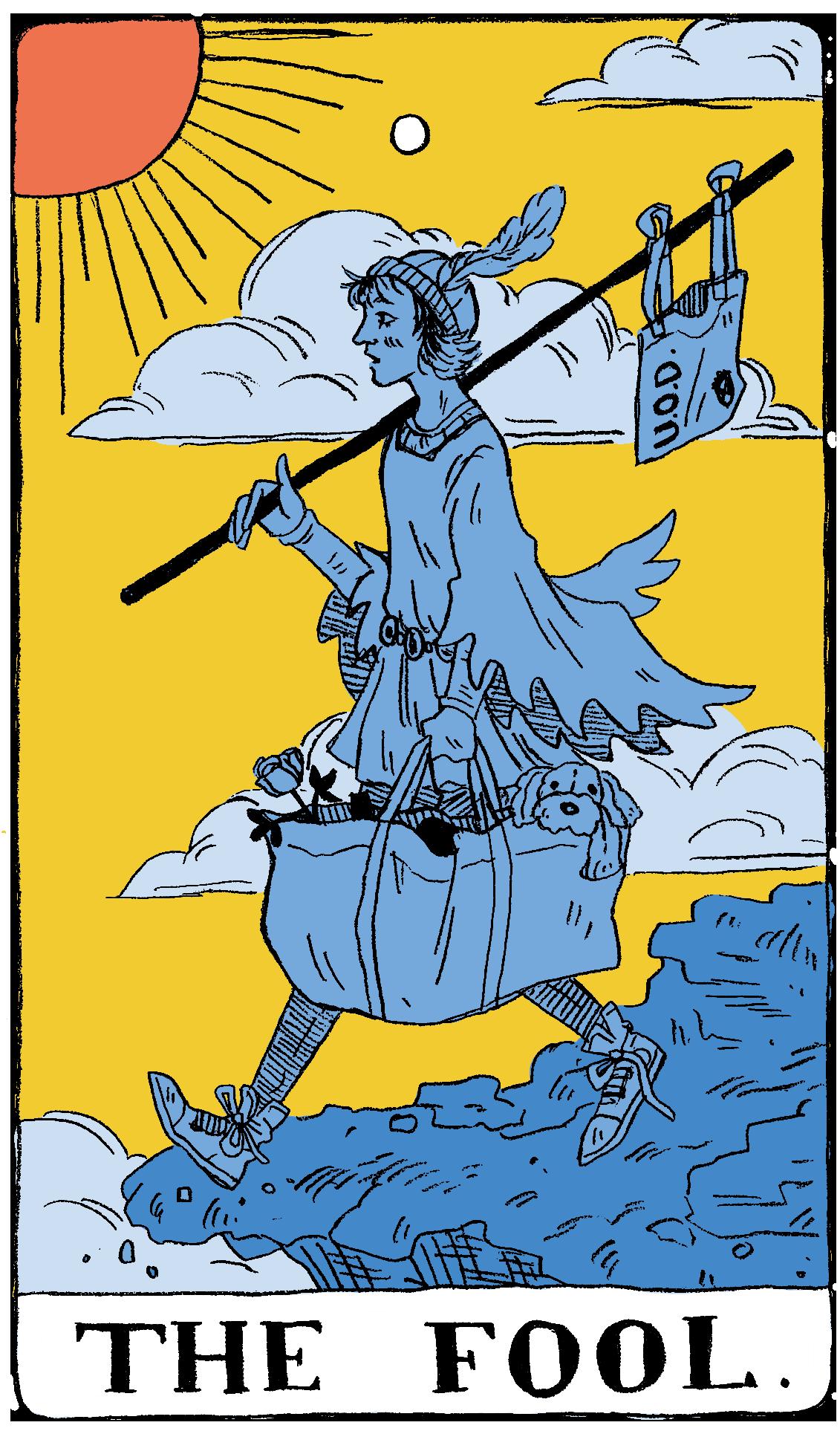 Words: Beth Chisholm, Illustration: D. Pryke Thomas
Words: Beth Chisholm, Illustration: D. Pryke Thomas
Words: Writers Name
Lifestyle 42
A Spot of Cocktails
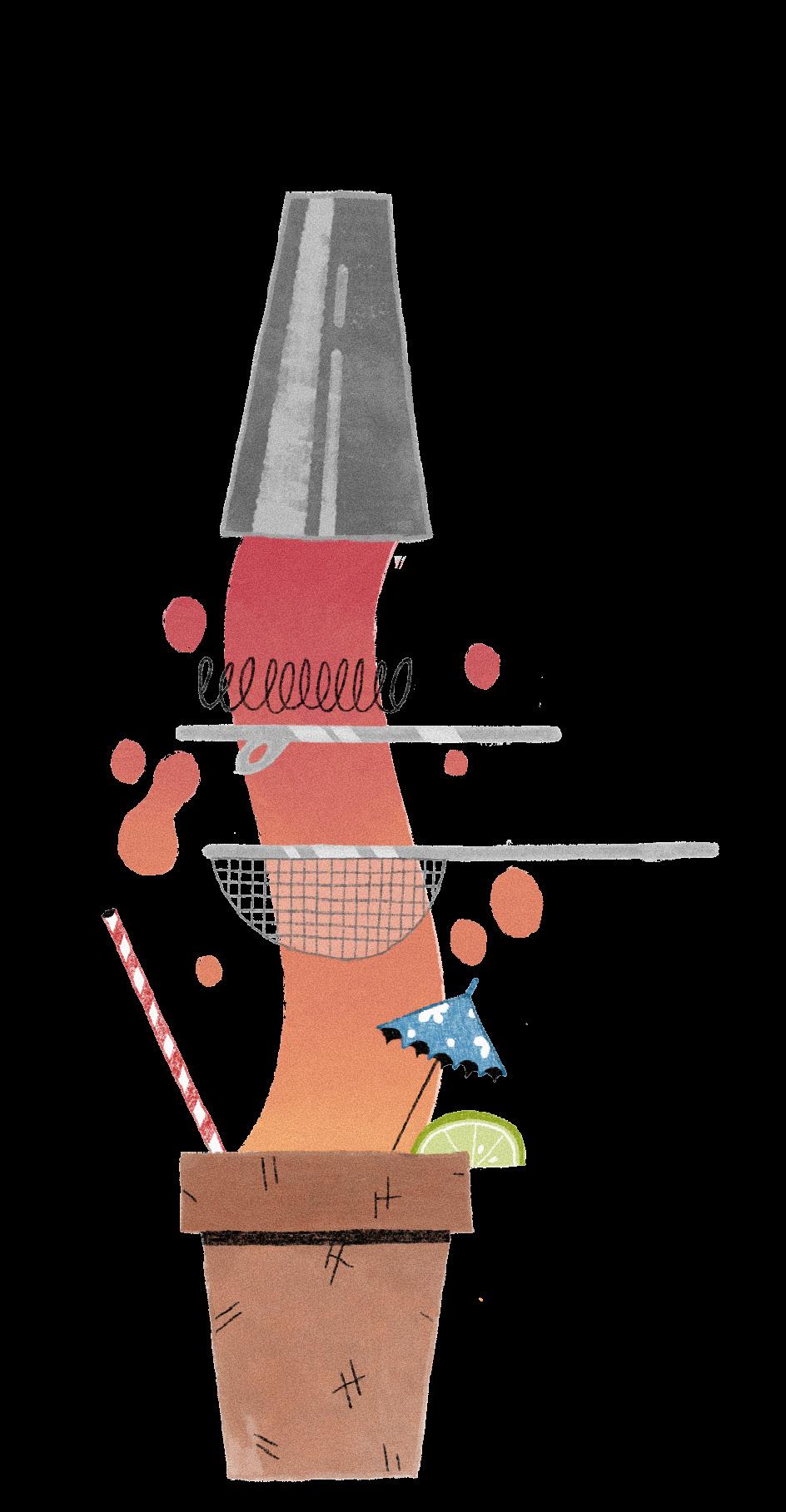
Nearly every student goes through a phase of being obsessed with cocktails and Dundee has a fair few establishments to visit. One of these places is The Giddy Goose, located at the centre of the beautiful Perth Road. I have visited a few times, and I usually find it difficult to try new places, in case I do not like the drinks, or it is expensive or loud! Luckily, the staff were super accommodating, and I found the loudness of the music to be bearable, which I unfortunately cannot say for all bars/ restaurants in Dundee (I am looking at you, Ward Road!).
I am fussy with what kinds of cocktails I am a fan of, so for me to try a new drink AND a new place in a oner would be unheard of. However, I did half-try something new. I got a pitcher of Sex on the Beach for £10, which I worried was expensive considering I was used to paying £7 odd at Spoons. Although I could not spot a Sex on the Beach on the menu, the waitress was lovely and assured me they were happy to make one up. The pitcher was huge, and beautifully decorated with raspberries and strawberries, making it an essential part of the obligatory Instagram story, and of course worth the money.
I also tried their weekly potted drink, which was Malibu, lemonade and cranberry juice served in a plant pot (lined with a drinking cup of course), priced at £5! The little pot was adorable, and resonated with the natural theme of the bar, which I will move onto in a second. It was a cheap drink consider ing it is in the centre of the town and was a themed cocktail. I love coconut and anything with cranberry juice, so it was a win from me! Now to the bar itself which is beautiful. They do have a beer garden that I am still to investigate as it was slightly too cold to explore when I went, but their indoor seating area is phenomenal. They have a few massive plants around the rooms, and shelves with potted plants which I thought were a nice touch. They also have little lights hang ing from the ceiling which helped to create a slightly darker, more relaxed atmosphere, also helpful for taking photos!
I recommend The Giddy Goose and their lovely staff to anyone looking for somewhere lowkey to relax!
their weekly potted drink, which was Malibu, lemonade and cramberry juice served in a plant pot
Words: Holly Higgins, Design & Illustration: Chloe Dickson
43On/Off Campus
Maria Georgieva
BRING ON THE DISCOUNTS!
A warm welcome to all new Freshers and a hearty hello to those returning. Something you might not know about your student ID cards is that they’re not just a reminder of that mugshot-like photo you took that will haunt you for years to come, but they can also get you some pretty sweet discounts in local shops in and around Dundee. Some shops put up a sign in their window stating that they offer student discounts but the majority of them operate under the “ask and find out” system. So this is for those who are too awkward to ask! Myself included.
FOOD & DRINK
For those of you wanting to branch outside of your basic pot noodle, Chopstix Noodle Bar offers a 10% to students. With their wide range of sauces, toppings, and serving options, it’s like a Subway for noodle lovers. On a side note, there’s no shame in admitting you need a fork instead of chopsticks. It’ll just get messy otherwise.
For those of you wanting a chill setting to hang out with friends or get some studying done, Henry’s Coffee House offers a 10% discount if you flash your ID card. There are two locations in Dundee: the City Square outside the Caird Hall, and Seagate. While they both have very chill environments, the City Square location gets rather busy around noon for lunch so later in the afternoon will be a lot calmer. Both locations offer a wide range of drinks, meals, and their baked goods are always top-notch.
For the smoothie enthusiasts amongst you, Fuel offers a 15% discount for students who show their ID card. Whether you need an energy boost, a healthy snack or you’re simply in need of a drink, their wide selection of smoothies caters to everyone’s needs.
TOP TIP:
Once you get home, add a drop of vodka to your average slushie or smoothie and you’ve got yourself a fruity cocktail without having to pay £6+ for a single drink*
On/Off Campus Words:
44
CLOTHING
Within the Overgate, there are shops that offer student discounts but do a bad job of adver tising it. Some of the shops that offer a 10% student discount include Superdry, Schuh, New Look, Footasylum, DV8, and many more. There are even lists created online by students from Dundee which highlight which shops in the Overgate offer discounts specific to students. So, if you’re too awkward to ask, there’s no harm in looking it up online. Whether you’re reinventing yourself, building on what you know, or still trying to find your style, there are plenty of discounts that will allow you to do so without emptying your bank account.
TOP TIP: Charity shops aren’t anything to be frowned upon. There are some really good clothes in there if you just take a look! And if you find something you like that isn’t in your size, well now’s the time for you to learn the life skill of sewing.
ESSENTIALS
While Paperchase is a bit more expensive than other places you could go for school supplies, their 10% student discount and £5 off on your birthday if you sign up for their loyalty card, certainly sweetens the deal. They have all the stationery you could possibly need with their beautiful notebooks, diaries, folders, and pens, you’re set to arrive at your next class in style.
For keeping yourself looking fabulous, Boots and Superdrug offer a 10% student discount. For basic hygiene like shampoos, body wash and deodorant, to more flashy things like hairstyling products, make-up, and hair dyes, they’ve got you covered. These stores are also great for their medical supplies and medicines for basic ailments to keep away that Freshers Flu. Lastly, they carry a broad range of sanitary products to cater to your specific needs, as well as condoms which you can always order online if you don’t want to look the cashier in the eye. We’ve all been there.
Aside from physical shops, there are many student discounts available in online stores through apps like Unidays, Student Beans and TOTUM, which I implore you to make the most of while you have a student email address. Many places that don’t offer them in their physical stores will offer them online so remember that you always have the option of buying online then collecting in store to save on delivery alongside your student discount.
*DISCLAIMER:
Drinking in public spaces is prohibited so please take your drink home.*
On/Off Campus 45 Design: Ania Wilson
The start of the academic year typically comes with a whole cocktail of emotions. From excitement to trepidation and from joy to dread, one sentiment among students is universal: we want to make this year as good as it can be. Now, the best way to ensure this is by being as good as we can be. Right?
University comes with the constant pressure to do better; pressure from our family, professors and ourselves. We tell ourselves that this time, this time we will do it right. This time, I will take notes during my lectures. This time, I won’t get distracted from my responsibilities. This time, I won’t be scrambling to finish an assignment the day before it is due. No, this is the semester I get my act together.
Of course, there’s a big difference between saying these things and actually going through with them. And the simple truth of the matter is that these goals aren’t always achievable. Not all at once, at least. As well-intended as they may be, they’re a lot to take on at once and inevitably lead to stress, which in turn can cultivate in various ways. Some of us will drive ourselves to do everything we resolved to do, fulfil every single responsibility and study like we’ve never done before… only to burn out after a month. For others, the stress is paralysing. Every day we think of the things we could do, the things we should
be doing, and every day ends with crushing guilt and no work done. The long-term result remains the same: both the student and their grades suffer. So where do we go from there? What’s important to remember is that change is gradual. Change that matters, at least. You can choose to dye your hair a bright colour tonight and look like a whole new person tomorrow, but becoming a new person isn’t quite as easy. It takes time, discipline, motivation and a whole list of other scarce things. Instead of going down that lane, consider this: improvement, no matter how small, is enough. So rather than striving for unfeasible goals, be patient with yourself and focus on small changes, rather than drastic ones.
Don’t force yourself to take extensive notes on every lecture and tutorial if you never did so before, because you will grow tired of it fast – instead, I suggest to begin with writing down keywords which seem important, and build up from there. There are other measures you can take outside of academics to benefit your studies. Creating structure in your life is one which I have come to find especially important. The lack of routine was a major point of struggle for me during COVID times. It often felt impossible to get in the right headspace to learn when it was happening in the comfort of my bedroom and while
Words: Lara Luyts
On/Off Campus 46
pre-recorded lectures have many advantages, for me it mostly resulted in last-minute watching while paying minimal attention.
Returning to campus has re-established some semblance to routine, and I’ve found it helps to create your own on the days you don’t have classes. Map out your week – it doesn’t have to be a detailed planning, but try to note down at least one activity per day. Make sure not to stop at dull tasks and responsibilities, include things you enjoy and treat yourself at least once a week. Personally, I reserve Saturdays for visiting Broughty Ferry beach with my friends and having lunch in our favourite café. It gives me something to look forward to and rewards me for getting through another week.
My last piece of advice is: try not to stay holed up inside. Whenever there’s a deadline coming up it’s easy to use that as an excuse not to leave your room, but even just taking a short walk can help you clear your head and let go of some stress.If you need to get work done but crave a change of scenery, pack your things and go to a park; enjoy the sunny weather while you still can! I love to spend warm days in Baxter park, either with a book to read or with my laptop if I have things to do. It does wonders for my mood, and the cute dogs stopping by for pets every now and then are a lovely bonus.
There is no perfect approach to handling University, but perfection is not what you should be seeking anyway. Search for the methods that work for you and search for the things that make you happy, then try to find a balance between the two. If you feel like you are pushing yourself to your limits, take a step back and consider what your best options are for the long run. Only by practicing self-care and patience can you make this academic year as good as it can be.
Design:
Jenny Thomson
On/Off Campus 47
Hannah Hamilton
‘Alright, Keep Your Secrets’
The Universal Declaration of Human Rights dictates in Article 12: “No one shall be subjected to arbitrary interference with his privacy, family, home or correspondence, nor to attacks upon his honour and reputation.”
In this day and age, that’s somewhat optimistic.
We are heavily encouraged to divulge every aspect of our personal lives. Whether it’s social media, hovering parents, or even corporations, everyone is interested in what we think and what we do. It all feels Black Mirror-esque and perhaps consequently fantastical, but the present issues are not far off dystopic.
The seeking of information has pervaded every aspect of daily life; it has become normal, even expected. The human hunger for knowledge knows no bounds, all of us eating further and further into the details of other people’s lives.
It begs the question, if we continue to burrow through the private lives of those around us: what will be left?
Studies suggest high levels of anxiety and paranoia. It has been observed that shoppers made to feel their privacy was being invaded will become hypervigilant, paranoid, and aggravated.
Privacy plays a vital role in the mental health and personal safety of many people. Apps like Twitter, Facebook, BeReal, are all asking for a piece of our inherent right to privacy. In exchange for this, users get likes, followers, attention. These things have become near currency in the modern world and the pressure to participate is staggering. To not participate is to be excluded from modern culture.
It stands to reason that the effects of a ubiquitous Big Brother on the public cannot be much more joyous.
Opinions Words:
48
Social media has encouraged us to expose every thought, free for the world to judge. We have, all of us, been sat before a network priest and asked to confess.
Slowly, the right to privacy is being removed in the chaos of the information age. Despite the phalo-centric language used in Article 12, this invasion disproportionately affects minorities and people with otherwise ‘alternative’ lifestyles as curiosity inevitably becomes scrutiny.
As we surrender ourselves to an adulthood of paranoia, it’s crucially important to remember that invasion of privacy begins at a very early age.
Consider the classic folly, a parent reads their child’s diary without permission and confronts them about findings they found displeasing. This, to the majority, is immediately concerning. What the child takes away from that experience is that they have no space in that house where can safely expel their thoughts, and in future they must more scrupulously hide anything that might be ‘shameful’.
The idea of a shameful secret is a tantalising concept. Seeking others whilst hiding our own, we all become hypervigilant over the safeguarding of what happens behind closed doors. This does not, however, stop secrets from happening. It only achieves an increase in anxiety and danger surrounding them.
By posting our children’s lives online, we open them to the idea that their life needs to be shared. Though mundane at first, consider the sharing of ‘embarrassing’ videos, stories, or information.
Permanent records of every funny childhood video and, later, permanent records of every developing thought as children begin to post for themselves. The missteps of a developing mind can now haunt them forever as part of a permanent digital record that defines
them to the world. It would be hard not to feel anxious in the face of eternal exposure.
Like a Polaroid revealed too quickly to the light, we risk marring the mental health of younger generations by handing over details of their lives. We should be doing our best to give them safe spaces to have and explore their own thoughts. Their lives, opinions, and mistakes are their own to share if they wish. How can we expect anyone to feel comfortable doing that if we continue to enforce this digital Panopticon upon society?
Of course, there are times when exposure has benefits. There’s something to be said for connection and the sharing of experience that can help us all feel understood. There are times too when the seeking of information uncovers something that would have otherwise festered.
However, the lines are becoming dangerously blurred between acceptable and harmful probing. With young people in particular, we should be very careful of how much we demonstrate an expectation to share their lives and subsequently how much they should be ashamed of.
It is this sort of scrutiny that villainises natural occurrences. There has grown a feeling of entitlement to the lives of others, both to know and have an opinion of. We are made to feel shame for our shortcomings, for what we do or don’t do.
Everyone has the right to privacy and should be given the respect and trust to judge for themselves what warrants secrecy. It is not something to be taken, but can be willingly shared. Though many will insist on confession, it is important to remember that the right to privacy is a humane and vital one. Use discretion, but by all means keep your secrets.
Sometimes what they don’t know really can’t hurt them.
Livvie Baird
Opinions 49 Design:
THE ELEPHANT
Nobody’s really been speaking about crypto lately, have they?
Hey, come on now, you remember crypto. You know, the unstoppable movement to replace old-world currencies with inflationary tokens. The online markets with highly volatile prices driven primarily by memes and a handful of highly influential twitter accounts. The pictures of apes that you’re supposed to buy now and sell later in exchange for a mansion, or a Lamborghini .
You know, the gigantic Ponzi scheme.
It’s been quiet on that whole front. Historically, the market experiences dramatic boom-thenbust periods, expanding its influence, before becoming oversaturated and capitulating. This time, I don’t see the phoenix rising from the ashes.
All the things that were required for mainstream penetration happened in 2020 - there was institutional buy-in and massive public interest. Ads hawking coin exchanges staring Matt Damon were aired during the Superbowl. Elon Musk made it his odious mission to pump several coins by hyping the hell out of them. Crypto has, nevertheless, experienced the single most brutal collapse in its entire history.
Because of a complete lack of regulation in the space, normie investors were able to over-
leverage themselves, which artificially inflated prices. They could go 10x, 20x, and even 100x their investment - the latter meaning that a 1% fluctuation in the price could either double their money or send it to zero. There were frequent mass liquidations as a result, sending prices tanking and leaving people broke.
Unsurprisingly, none of the widely anticipated milestones were hit. Bitcoin was supposed to crack $100,000 this cycle, but it could barely sustain itself above $60,000. Why? The short answer is because expectations were wildly ungrounded and the coins have no inherent worth, making them ever-shakier investments as prices skyrocket. After two years of this madness in the public eye, crypto’s rep among normal people has been reduced to a bit of a joke. The scene itself does little to help itself in this regard.

A absurd as it seems, it’s like any other scenecomplete with its own culture and lingo. Things that seem daft on the outside begin to make sense after being initiated a while. Of course I get it. You give the slurp juice to the ape and more apes show up. Then you get rich.
Hang on, no, I’m definitely going insane.
Sure, there are occasional winners. A friend of a friend was able to retire because he bought some dogecoin in 2017. A former colleague
“ “
The one thing that connects all of us is that we couldn’t really afford to lose the money. We all dreamt of early retirement.
Opinions Words: Stewart A. Burnett 50
of mine watched his investment quadruple, but he held too long and sold at a loss. And - confession - I bought in and lost a hundred quid, but some of my friends lost even more. The one thing that connects all of us is that we couldn’t really afford to lose the money. We all dreamt of early retirement.

By the way - my former colleague? He’s looking into taking out an £8000 loan. He talks about ‘wonderful things happening in the space’, and I don’t think he can really justify that choice of words, or reflect on their meaning.
It’s difficult to sympathize with people whose catchphrases are “have fun staying poor” and “FUD* alert” (*an acronym of ‘fear, uncertainty and doubt’ used to handwave negativity). These people rarely, if ever, pass the vibe check. But sympathy is, like many things on the road to progress, a painful necessity. The sooner that we can overcome the petty squabbles that capitalism forces us to engage in, the sooner that we can turn our focus towards the real problem.
Our economic system is broken. It cannot be fixed. The means of repair from within is too tangled to even touch. Anybody who attempts even modest change (your Jeremy Corbyn and Bernie Sanders-types) get lambasted by mass-media until they are deemed incapable of winning. We are divided and then pitted
against each other to ensure that, collectively, we remain in a state of perpetual gridlock. Then, with our spirits crushed, we make our bones with a degrading deal while the world cooks and our pockets are emptied.
~TO THEMOON!~IN THE ROOM
More than ever, with rampant inflation and a revolving door of horrid Tory leaders, it feels hopeless. It’s easier to conceive of magicking your way into wealth by some cheat method than it is to conceive of modest progress. A lot of effort is being put in to prevent us from being capable of that. Mainstream media is designed to quell optimism and keep us biting at each other’s ankles.
I think everybody realises this - to an extent, no matter how toxic or lame their coping strategies are. That’s why I don’t scorn the crypto kiddies - easy though it may be. They are as desperate as any of us, grabbing onto the first life raft that they come across.
Opinions 51 Design: Daniel Somoghi
Can Women Win in Casual Sex?
I hope everyone had a great Hot Girl Summer; but don’t feel bad if you didn’t. No matter how much or how little sex you have, it doesn’t impact your self-respect or empowerment, but the pressure to adhere to a certain sex life can negatively impact you either way.
For centuries, women have been slut-shamed and exposed to a gross double-standard to make us feel guilty about our sex lives, no matter how active or inactive they are. To fight back, women have protested in slut-walks, and chanted about how we can do whatever we want with our bodies- we can, and we should. A wave of female empowerment has entered the feminist space: slut power. However, when I got out of a long-term relationship, and began to feel the pressures to have a ‘hot girl summer’ or to sleep around to move on, I started to feel a lot less empowered and a lot more self-conscious of what was expected of me as part of this movement in feminism. Having casual sex is a great thing, women are human beings with urges and desires the same as men, but how much is ‘hot girl summer’ geared towards empowerment? And how much are we made to believe it is because it’s what men want from us?
Even as a self-proclaimed ‘emotionally unavailable’ person, it’s difficult not to feel used after a one-night stand. There is some science behind this- if you feel the same, you’re not clingy. During sex, oxytocin is released – a hormone often referred to as the ‘love’ or ‘attachment’ hormone – after your oxytocin levels plummet the day after sex, you can feel low and will long for that feeling again. So, you can blame it on your hormones.
While men love the idea of casual sex that suits their independence, they still shame women when they partake in it. If you sleep around, you’re a whore and if you don’t, you’re boring or frigid. But when you offer one particular man casual sex, that’s fine because it’s what they want from you anyway. Of course, not all men involve themselves in such misogynistic behaviour but the (straight) men who would fight against this double standard - which works in their favour so often - are few and far between. Women can never win, so do whatever you want –but make sure it’s actually what you want, and not how you feel expected to act.

52
“Grow a personality, yeah?”
Psychotic, looney and mad. Three of my favourite insults! Whatever could I have done to deserve such charismatic compliments? I have BPD, Borderline personality Disorder. My way of thinking can be black and white. My thoughts are irrational and drive me to impulsivity. I don’t like the term BPD. Even Medicine is deciding to ditch it for a more dignified ‘Emotionally Unstable Personality Disorder’ which I’m not a fan of. I have always been open about my mental health and I’ve had mixed reactions following my diagnosis.
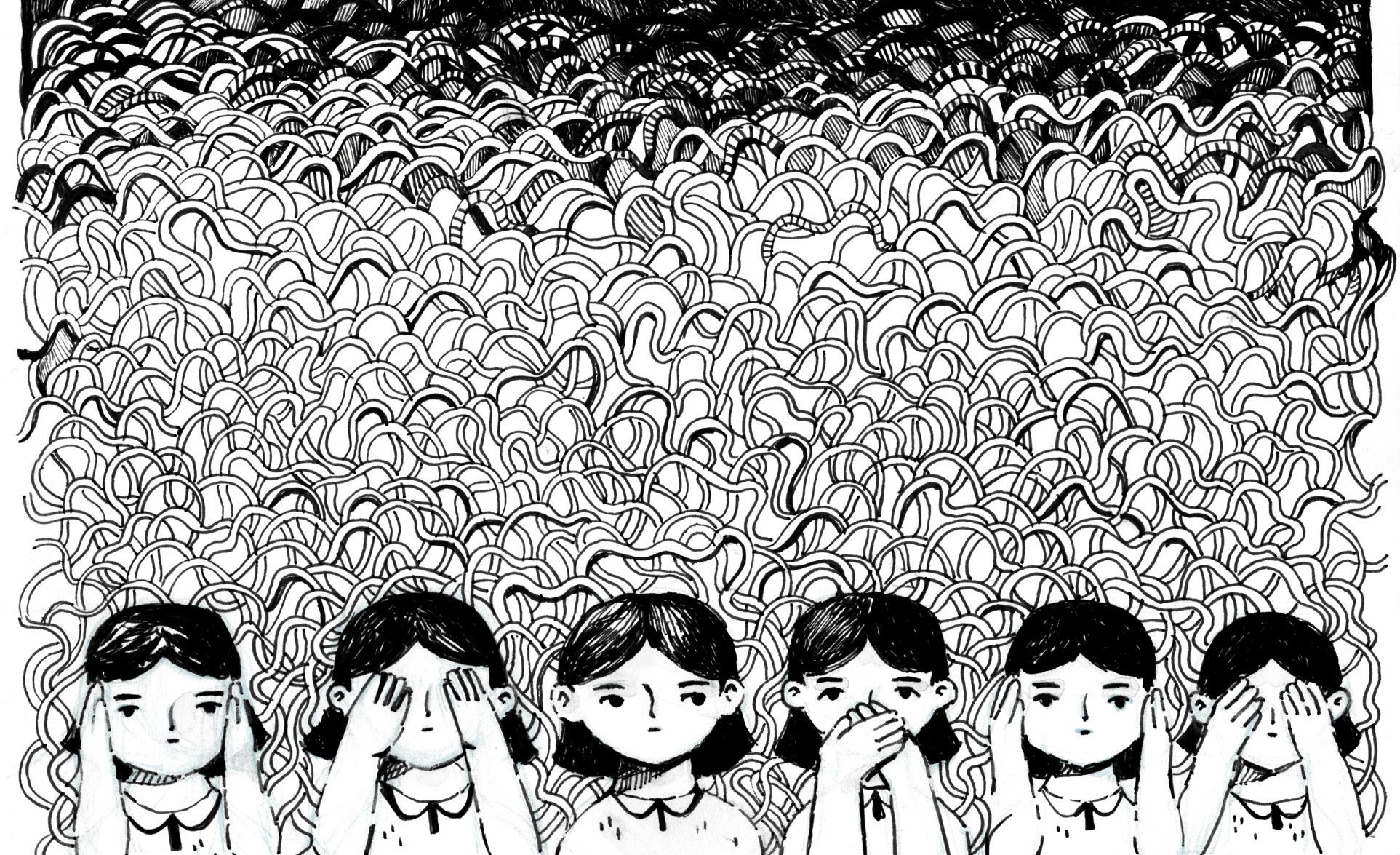
The term ‘unstable’ is off-putting and unflattering. When I was diagnosed, I realised that BPD has a horrendous stigma. People with BPD can be labelled as abusive and manipulative right off the bat.
I was warned by one of my mental health nurses that I will find it difficult to ever go private, as even in Dundee a few clinics refuse BPD patients. While reading online I found many articles like ‘I hate people with BPD’ with thousands of shares.
My goal is to challenge the way people think when I tell them I have BPD. People who experience disorders such as BPD experience mood swings, anxiety, and self-destructive tendencies. I don’t believe it’s fair to let these symptoms define us. You would not define someone by physical symptoms of another illness. It’s important to remember that friends, family, teachers, nurses, anyone can have BPD. I’m a person, I go to university, I live my life. Perhaps I need a bit more support and encouragement to do so. I’m moody, but I do find peace in the ephemerality of my emotions. I experience depressive swings, but the low moments never last. I have a personality disorder, but I am not exempt from this, I mess up and hold myself accountable, it’s the same principle except I have BPD. It’s not difficult to understand and understanding is all we need. It breaks my heart to see discrimination towards personality disorders.
If you take one thing from this article, let it be that you think before you speak or assume about someone from their diagnosis alone. Show some compassion. You don’t know what people are going through and I can promise that people with BPD are trying their best.
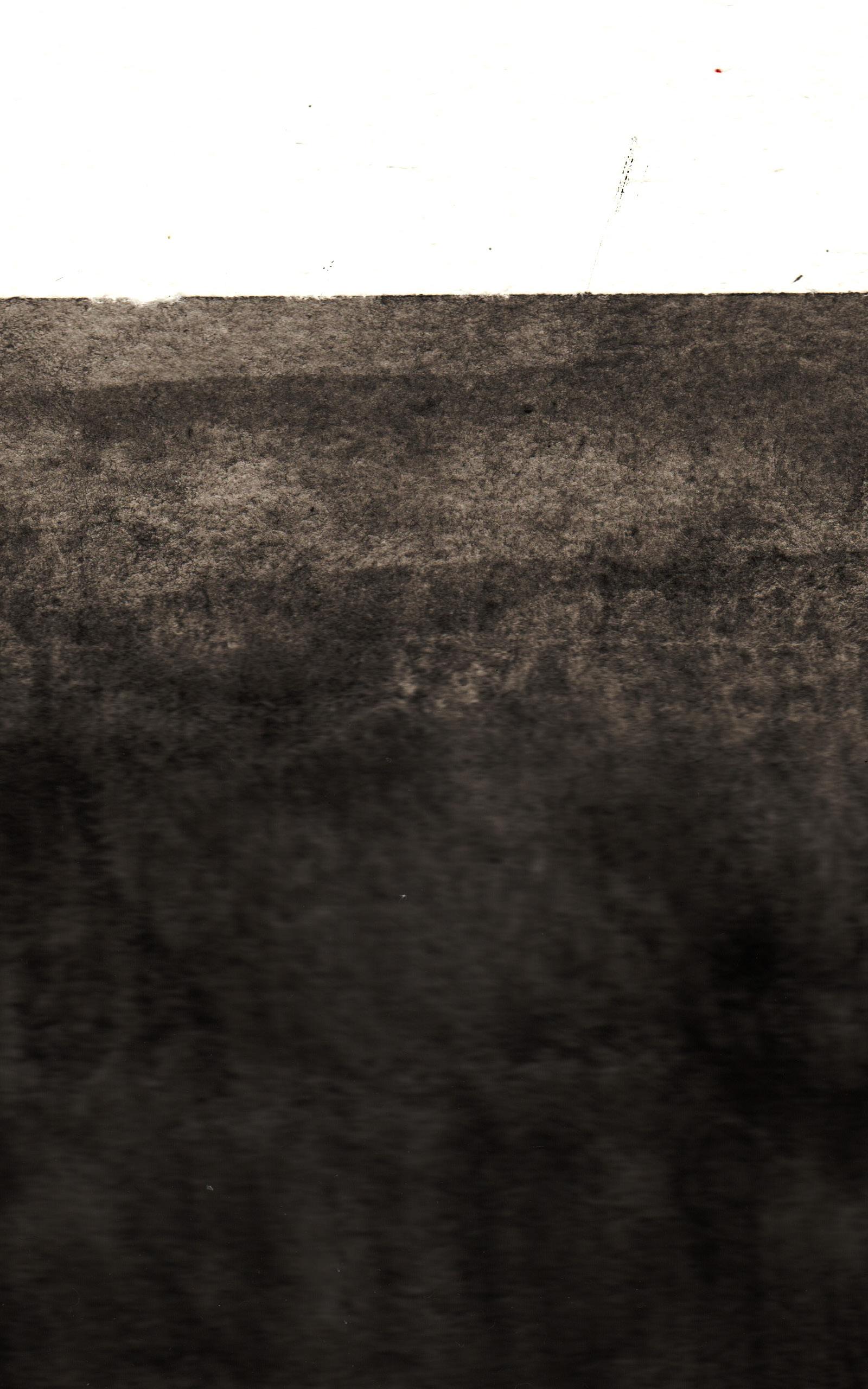 Words: Holly Higgans, Design: Jillian Mendoza
Words: Holly Higgans, Design: Jillian Mendoza
“It’s not difficult to understand and understanding is all we need.”
Opinions 53
Social Media has a Predator Issue
SEXUAL ABUSE/GROOMING
The internet native generation has been criticised for its addiction to social media. Young people, scrolling happily for hours and days without a care for the world around them; forging communities, friendships and producing millions of hours worth of content. Frequent usage of these sites has caused them to become an integral aspect of life. People keep in touch with their loved ones and some earn money from it. It also provides everyday entertainment and is a great tool for education. But, social media is not without fault.
Since the internet and social media have become easily accessible to everyone, including children, some have found many ways to weaponise it.
In 2021, at a higher rate than before the pandemic, children were targeted by predators online, throughout lockdown. The FBI estimated 500,000 active online predators every day. In the first nine months of 2021, Facebook had to remove more child sexual abuse material from their site than the previous year’s total.
Unfortunately, some of these criminals are not just faceless profiles in a comment section,
stealing and redistributing content or disgustingly downloading illegal files. Some are creators with millions of followers, wielding much influence over their impressionable audiences.
Desensitisation to assault is nothing new on the internet. From Shane Dawson and the Fine Brothers ‘Hey it’s Milly’ series, relying on jokes about the sexual assault of a child, to James Charles admittedly using Tiktok as an underage dating pool, to Austin Jones asking teenagers to send him sexual videos leading to imprisonment. Social media has platformed many of these criminals for years prior to their downfall. But even in the last year- there has been a wave of comeback videos from creators such as MiniLadd - who was called out for messaging minors – selling the story that his cancellation was a learning journey and the best thing to ever happen to him.
Although we, as responsible adults can take action and report the content and its creator to get them removed, social media sites seemingly never permanently ban dangerous predatory accounts. They let them have another chance to continue exploiting their audience. How can sites like Instagram be able to let you block a person and any new account they create, yet allow Twosoulsonebod to recruit children for their sex education discord? When will social media protect its users and how many more will fall victim to these predators before then?
Words: Bori Bartok, Design: Livvie Baird Opinions 54
CONTENT WARNING:
Fandoms, or fan communities, have in recent years been marked by their notable online presence. Most popular media have dedicated fan bases and encountering fan accounts on social media is almost unavoidable. Often these fans are criticised for their obnoxious behaviour, yet fandoms continue to grow in numbers. So, what is it that draws people, especially teenagers, to these online spaces?
When I first discovered fandoms during my teens, I didn’t expect to form any genuine connections, yet that’s what happened. At the time I had trouble befriending my peers, so I found comfort in the easy acceptance fandoms offered and latched onto their communities which, in my eyes, were full of kind and supportive people.

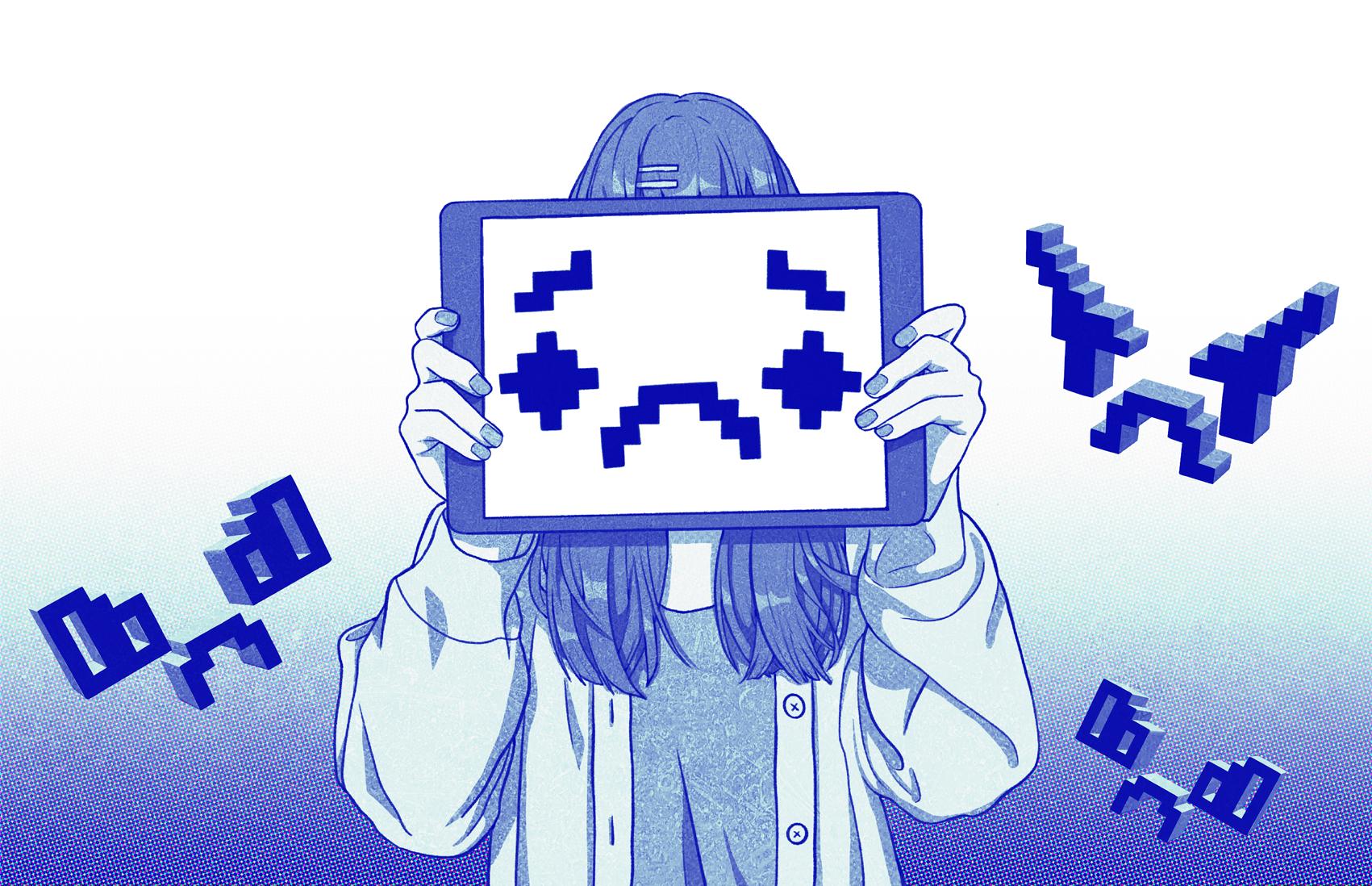

Since then, I’ve learned how toxic fandoms can become, especially when you are as dependent on them as I once was. The internet provides the perfect form of escapism for the lonely and unhappy, and within fandom spaces these (often young) individuals are free to be whoever they want. Eventually, your days are spent anticipating the moment you can turn on your phone and forget about your problems. At that point, your online self begins to feel more real than the person your family sees every day.
The sense of safety present in fandoms stems from their anonymity. Most fans with accounts dedicated to their interests go by a different name, slimming the chances of offline acquaintances discovering their online persona. The comfort this creates encourages the exploration of identities and, with how prominent LGBTQ+ communities tend to be in fandoms, queer and questioning fans can freely talk to others who face similar struggles.
But that same anonymity can inspire irrational hatred and a lack of responsibility. Actions have no palpable consequences, and so small mistakes or misunderstandings get blown out of proportion by those who are eager to vilify. Enjoying fandom spaces becomes challenging when you can go from having dozens of online friends to receiving death threats in mere hours. It’s as depressing as it is anxiety-inducing, and if your happiness relies on fandoms the damage is does to your mental health can be severe.
Despite this, dismissing fandoms’ positive impacts can deny young people of a safe space to find themselves. Like most ,I’ve had my fair share of negative experiences, but that doesn’t make fandoms inherently bad. It’s all about finding the right people, and putting yourself first when the situation warrants it.
Opinions 55 Words: Lara Luyts, Design: Ada Ung
Russia
The Global South Can Make or Break
Sanctions are devastating the Russian economy. WorldBank forecasting sees an 11% decrease in GDP. Vital commodities exports (think oil and gas) will drop by over 30% by December. Inflation is up at 22%, meaning daily necessities will skyrocket in price. This is to say, Russia’s economy is reliant on nonWestern partners to keep it afloat.
Despite attempts to isolate Russia from the global community, much of the Global South has refused to turn their backs on Russia. We can expect states such as China, Iran to shrug off calls for condemnation. However, there are many states with a more neutral stance in global affairs, whose response to the invasion of Ukraine has been muted.
India and many African states have old ties with Russia for numerous reasons. India, positioned neutral in the Cold War, has a healthy economic and arms-based relationship with Russia. It has increased the percentage of oil it imports from Russia amid the price drop. North African states, like Egypt, found them an ally at times. Many African states like Mali or Chad have budding military ties. The leaders of Mali’s coup last year were trained in Russia. For states who maintain ties with Russia, it’s a rewardsbased venture.
However, the global food crisis, caused by Russian
blockades of Ukrainian ports, has seen those rewards slip. African grain-importers have been hit the hardest. Ukraine accounts for 12% of Africa’s wheat imports, Russia’s disrupted exports, account for 32%. In Africa, this creates hunger and anger. As Edmund Burke said, “And having looked to government for bread, on the very first scarcity they will turn and bite the hand that fed them.” To authoritarian African leaders, stability is paramount.
Here exists an opportunity. African leaders have already pressured Russia into signing a treaty with Ukraine, Turkey, and the UN in July, allowing exports to resume. The influence of African states, who rarely have such a hand in global affairs, is evident. If they applied that same diplomatic pressure against the invasion, Russia could be forced to downscale the violence. Alongside India, for which Russian oil only makes up about 3% of their total oil import, Russia could find itself held to account by the countries it attempts to influence.
Convincing these states to condemn Russia would be an impressive political accomplishment. It would take massive economic, diplomatic, and military incentives. But the principle still stands, the Global South has a rare opportunity to exert global power and support a peaceful end to the invasion of Ukraine.
Doherty, Design: Livvie Baird
DUSAsk Words: DUSA 02Opinions Words: Cameron

Split Brain Research: Two Halves or a Whole?



The idea of the left brain vs the right brain is commonly found in modern media, the notion that the left brain is more logical and calculating while the right is more imaginative and creative, even though we as people are more left or right brained depending on what qualities we have. But in reality, this division of the brain, also known as lateralisation, is far more complex. Evidence collected over the years has shown that the two hemispheres are responsible for different cognitive tasks with the left hemisphere dealing with language processing, aka recognising and speaking language, while the right is responsible largely for recognising emotions and how good you are with directions.
While these findings tell us a lot, the most shocking and strangest discoveries were made in the 50’s and 60’s when the psychologist Roger Sperry documented the aftermath of patients who had their corpus callosum, the piece of brain connecting the left and right, cut, therefore essentially splitting their brain in two. The tests found that this cut caused multiple strange effects. At first it was noticed that unfamiliar actions such as stringing beads couldn’t be done but more familiar actions such as tying shoelaces could be performed with ease. However, over time stranger consequences were found such as the patients
Science & Technology Words: Matthew Curry 58
reported feeling as if there were two people in one body, sharing control over it. Over time this changed with some patients showing signs that the two sides of the brain would cooperate without the direct connection. An example was Sperry noticing that when a colour was shown to the right hemisphere they could recognise it but when asked what it was, they could not say it, as this was the left hemisphere’s role. Instead, the left hemisphere would guess by saying a colour at random and if it guessed wrong, the right hemisphere would prompt a frown as if to tell the left that it was wrong.
Still, this was not the strangest of the effects as later a case study of Karen Byrne would be discovered and her “alien hand syndrome”. Karen suffered from epilepsy and so had her corpus callosum cut to treat it, however after the operation she found that her left hand began to function independently of the rest of her body. This was apparent when it began unbuttoning her shirt without Karen noticing or even when she would light a cigarette the left hand would then reach forward and stub it out completely unconsciously.
More recent studies performed suggest that this brain split between left, and right is not as severe as previously thought and that brain functions are divided evenly throughout the brain. But this does not explain the strange phenomena that occur when the brain is split in two, which begs the questions of how divided the brain is and whether we are just made up of multiple parts.



 Design: Emma Power
Design: Emma Power
Science & Technology 59
Little EngineersThe Fire Resistance Skills of Beavers
Beavers have long been known to have a significant impact on their environment, but only recently have we learnt the degree to which their water management methods can positively shape an eco-system. This understanding has been furthered by Doctor Emily Fairfax who studies the positive impact the presence of beavers has on mitigating the impact of floods, droughts and, remarkably, wildfires.
Wildfires have, historically, been rare in the UK but the frequency of these disasters is rising at an alarming rate. Between 2011 and 2017 under 100 wildfires over 25 hectares were recorded in the UK, comparatively, in 2019 alone, over 137 occurred.
Centuries after their extinction in the UK in the 16th century due to overhunting, beavers were reintroduced to England in 2002 and Scotland in 2009. There are now estimated to be over 1000 wild beavers across the UK. They build dams to create a ‘home pond’ where they will construct their lodge (essentially, their home). Then they dig multiple canals outwards to allow them reach further trees, access food and improve their mobility in the surrounding area. This method of water management could provide beaver-driven fire resistance for natural spaces.
Beaver complexes store and spread significant amounts of water in the home pond, adjoining canals, and soil. This creates an underwater irrigation system effective enough to enable plants to survive for years of drought. The large amount of water and the surrounding sponge-like soil creates an aqua barrier which slows the spread of fire. Very simply, a large body of water and widespread areas of damp grounds are, by their very nature, incredibly difficult to burn. In fact, streams with beavers burn three times less intensely than those without beavers, meaning that wherever a fire does enter a beaver dammed area, its destructive potential is lessened. After a wildfire has taken place, the green space surrounding the beaver complex becomes a refuge for wildlife where they can find water, vegetation, fish etc. which allows them to endure amidst the charred remnants surrounding them.
While the long-term solution is a prolonged commitment to address climate change, immediate mitigating action is necessary to reduce the devastation impact of floods, fires, and drought in both wild and urban spaces. These mitigations are expensive and time-consuming but embracing the beaver’s incredible ecosystem engineering may provide a necessary service without these prohibitive obstacles.
Science & Technology Words: Rachel Lawson 60
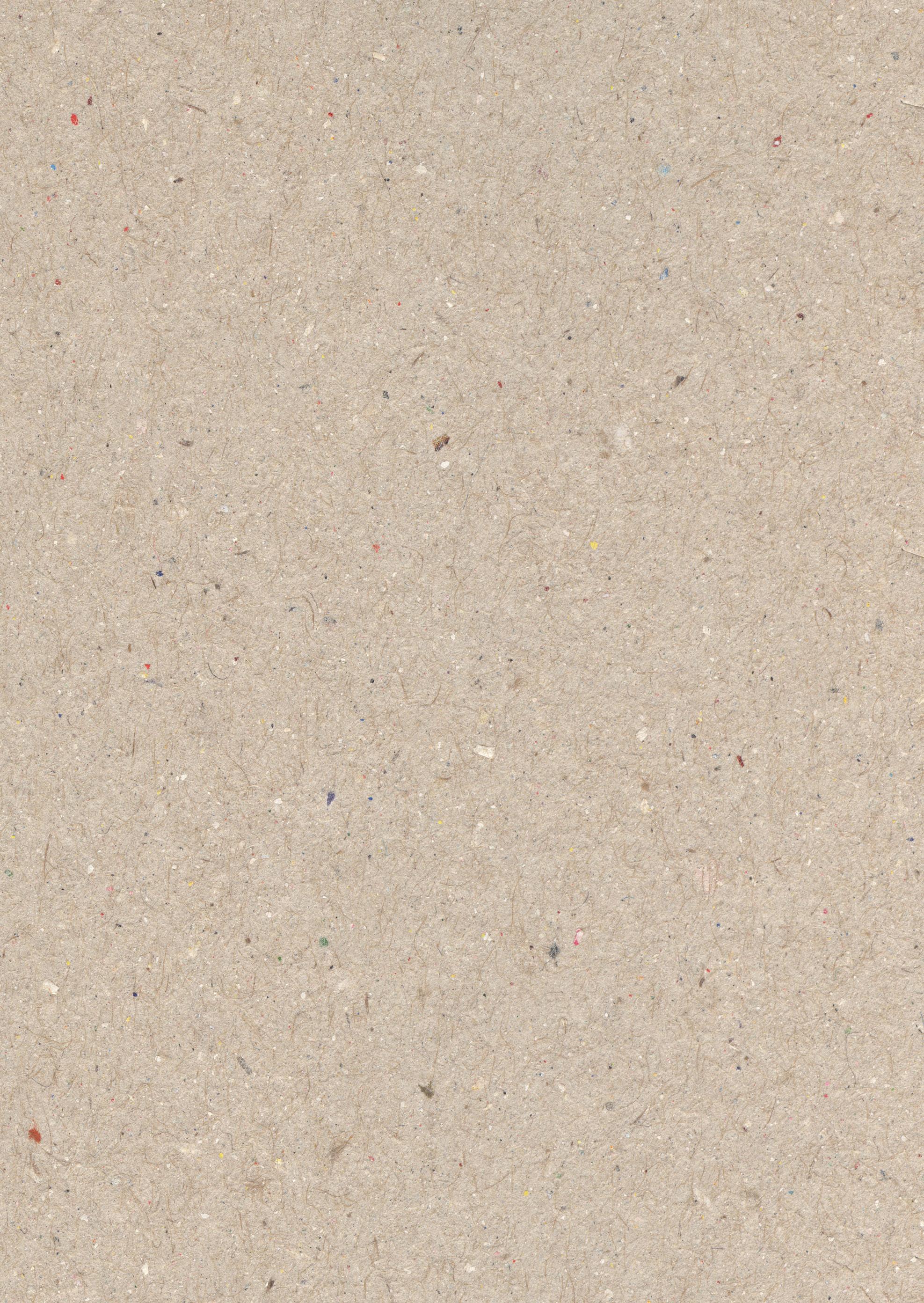
 Design: Lewis Elks
Design: Lewis Elks
Science & Technology 61
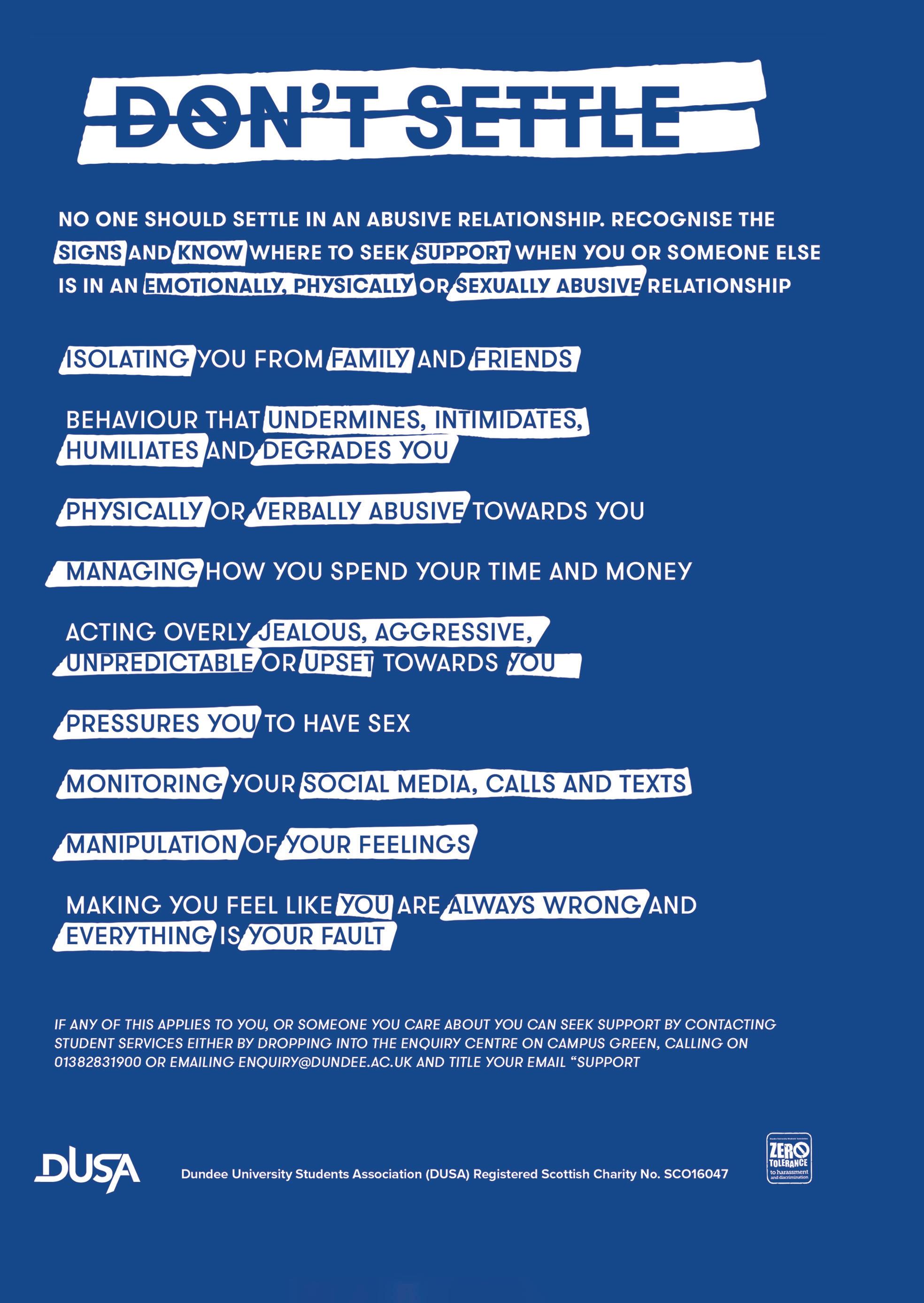
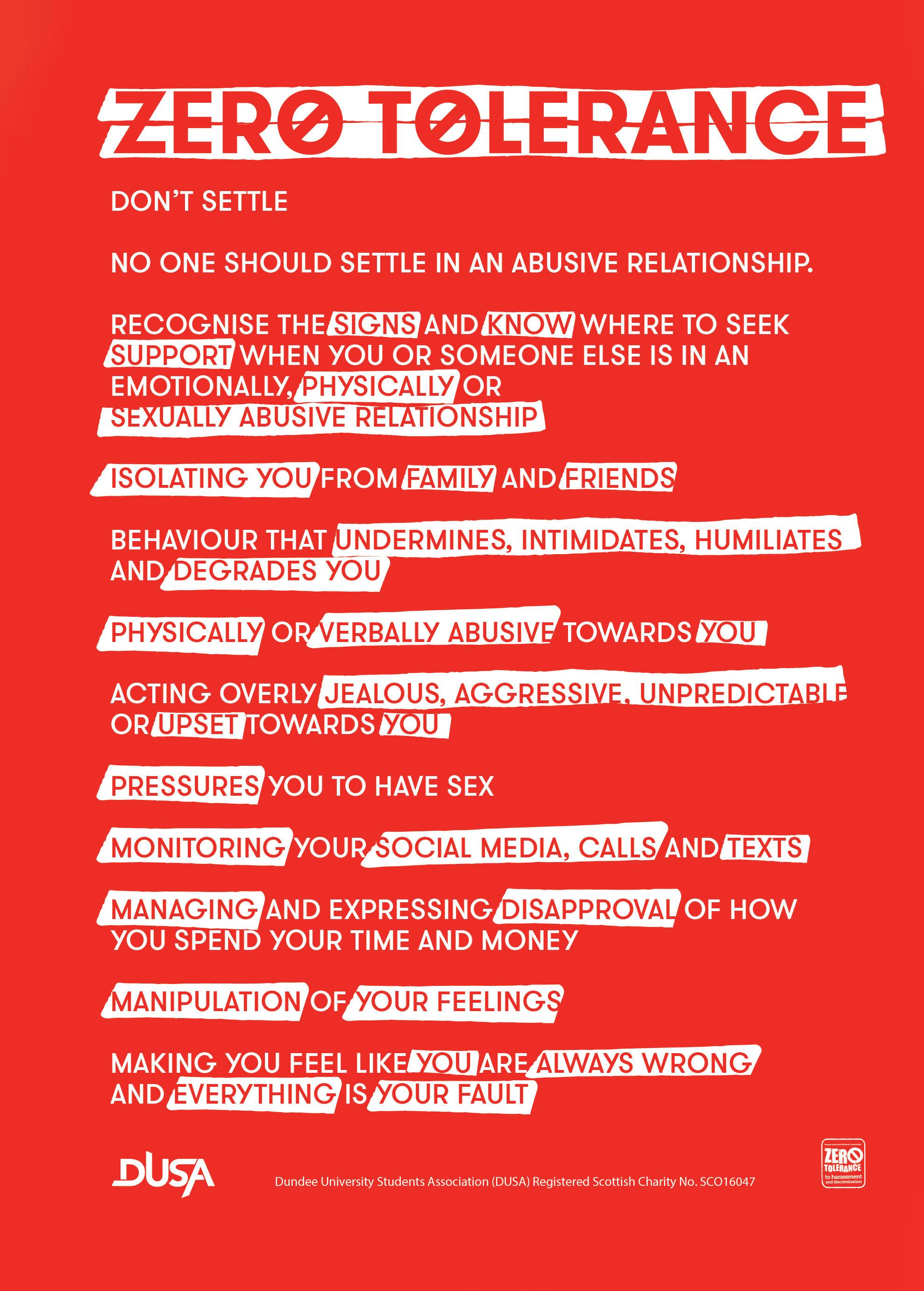
Acknowledge ments
Editor-in-Chief Creative Directors Senior Team
Dani McFawns Livvie Baird Phoebe Wilman
Senior Editorial Team
Administration Manager Managing Editors
Ellie Munro Bronte Chalmers Maria Georgieva
Creative Team
Photography Team Social Media
Ada Ung Lucas Ferguson Maria Touloupa Lewis Elks
Nick Morton
Website Manager Senior Feature Editor
Ivan Amigo Rachel Goodman
Illustration Team
Chloe Dickson D. Pryke Thomas Gracie Whitehouse Jack Stamp Jillian Mendoza
Section Editors & Publishing
Arts & Entertainment Current Affairs
Georgi Zhechev Arrowyn Williams Emma Sturrock
On/Off Campus Publishing
The Magdalen is published by Dundee University Student Association (DUSA).
Creative Writing Lifestyle Opinions
Catriona Pritchard Roshni Baillie Cameron Doherty
Cover Illustration
Gracie Whitehouse
Issue #95 Cover is by our very own staff illustrator: Gracie Whitehouse. Thank you, Gracie! ❤
Credits
callingcall reatives the lunchclub zine
We are back for another issue, our goal is to showcase the talent of local creatives. Check out our Instagram to find out more!
@thelunchclubzine
issue 2
@themagdalenmag
The Magdalen Magazine
@themagdalenmag www.themagdalen.co.uk
The Magdalen Magazine with us online!
Join our team!
If you're a UoD or Abertay student and have a passion for design or writing, we’d love to hear from you!
Connect
Upcoming Events
17 September Freshers Week
Events on until the 25th September. https://www.dusa.co.uk/freshers
21 September Dog Therapy Picnic
Come down, meet new people, have a snack, and pet some dogs.
25 September Freshers Fair
An absolute MUST DO event during your Freshers Week!
01
Noughtie But Nice!
October Come find us in Floor 5, living our very best Y2K fantasy.
DEMS with Guest DJs21
October
Event hosted by Dundee Electronic Music Society (DEMS).
DUSAsk Words: DUSA 02
